STEADFAST
SouthwesternNews FALL 2018
You are invited to Carols at Christmas Celebration
Presented by the School of Church Music
Thursday, December 6, 2018
Seven-thirty o’clock in the evening
MacGorman Chapel
















youthministrylab.com
MARCH 29–30,2019
LOGAN WALTER BAND Main Stage Worship
TONY MERIDA Lead Pastor of Imago Dei Church Main Stage Speaker
TOM ELLIFF Former IMB President, Former SBC President, Pastor, Missionary
DOUG BISCHOFF Next Generations Minister at FBC Houston
JOSEPH BACKHOLM Director of The Embassy at The Colson Center for Christian Worldview
MARIAN JORDAN ELLIS Founder of Redeemed Girl Ministries
HAROLD O’CHESTER Pastor Emeritus of Great Hills Baptist Church, Austin
JASON SALYER Student and Families Pastor at East Maryville Baptist Church
ANDREW WALKER Director of Policy Studies at Ethics and Religious Liberty Commission
RICHARD ROSS Professor of Student Ministry at Southwestern Seminary
RYAN BOWMAN Chick-fil-A Senior Program Principle Lead
SARAH BUCHANAN Pastor’s Wife, Mother of Five Boys
DANIEL WILLIAMS Minister to Special Needs Families at FBC Houston
ERIC FULLER High School Pastor at FBC Woodstock, Georgia
MARCH 4–6, 2019



SOUTHWESTERN BAPTIST THEOLOGICAL SEMINARY FORT WORTH, TEXAS
• PLENARY SPEAKERS –Alistair Begg, Phillip Pointer, Noe Garcia, Bryan Carter, David Allen, and Kyle Walker
• 42 BREAKOUT SESSIONS in 8 tracks, including tracks in Spanish and Korean

• WOMEN’S TRACK with sessions in text-driven teaching and leadership





• FULL EXHIBIT HALL
• LATE-NIGHT SESSIONS featuring many of the plenary speakers
Register at preachingsource.com/conference.
IN THIS ISSUE
FEATURES
ANSWERING THE CALL
Southwestern students have answered God’s call to prepare for ministry, and Southwestern professors have answered the call to equip them.
CHAIR OF FIRE: SETTING THE CHURCH ABLAZE FOR EVANGELISM
Matt Queen strives to instill his passion for evangelism in his students, the church, and, most importantly, his family.
‘I NEVER GOT OVER THE FACT THAT GOD SAVED ME’: THE PASSION FOR REACHING LOST SOULS
As Southwestern’s new instructor in evangelism, Carl Bradford aims to equip his students with the tools they need to win souls.
PASSING THE BATON: TRAINING THE CALLED TO PREACH GOD’S WORD
Preaching professor Matthew McKellar guides aspiring preachers through the process of getting equipped to rightly handle God’s Word from the pulpit.
HARD WORK IN SEARCH OF THE PRIZE: LOOKING TOWARD A RESURGENCE IN TEXT-DRIVEN PREACHING
Kyle Walker remains committed to serving the Lord, be it through his role as preacher, professor, author, or vice president.

MAKING LIFETIME DISCIPLES: 50 YEARS OF INVESTING IN YOUTH MINISTRY
Former youth pastor Richard Ross now ministers to multitudes of teenagers and their families by equipping the next generation of youth leaders in the classroom.
ENCOUNTERING THE LIVING GOD THROUGH HIS LIVING WORD: TEACHING AND DISCIPLING STUDENTS TO LOVE GOD WITH THEIR MINDS
Systematic theologian and passionate discipler Katie McCoy directs her students to grow in their love for and desire to worship the Lord.
AN INSTRUMENT FOR THE LORD: SERVING THE CHURCH AND HONORING GOD THROUGH MUSICAL EXCELLENCE
As the Albert L. Travis Chair of Organ in Southwestern’s School of Church Music, Yoon-Mi
Lim gets to combine her two passions: music and teaching.
SINGING OUR THEOLOGY: LEADING GOD’S PEOPLE IN UNHINDERED WORSHIP
Nathan Burggraff tries to help his students become both musically skilled and theologically oriented.
PASTOR-THEOLOGIAN: A MINISTER TO MINISTERS
Research Professor of Systematic Theology Malcolm Yarnell’s primary calling is to develop pastoral character in students so that they will build churches that glorify Jesus.
A WORTHY INVESTMENT OF ONE’S TIME: STRIVING FOR A DEEPER UNDERSTANDING OF GOD’S WORD
The ultimate investment of Ryan Stokes’ time is in students as he helps them along the path to better understanding God’s inspired Word.
4
5
STEADFAST 10 16 36 12 32 20 40 44 48 24 28
EVERY ISSUE
IN
UPCOMING EVENTS
LETTER FROM THE PRESIDENT
FIRST LOOK
CAMPUS NEWS
AROUND THE WORLD
LAST WORD HIGHLIGHTS
EVERYDAY EVANGELISM
STUDENT LIFE
MINISTRY PARTNERS SouthwesternNews FALL 2018 STEADFAST ON THE COVER Southwestern remains steadfast in its commitment to train students to preach the Word and reach the world.
6
52
67
68
60
61
66
UPCOMING EVENTS
FALL 2018 Volume 76 Issue 3
swnews.org
Executive Editor Charles Patrick, Jr.
Director of Communications Adam Covington
Art Director Aubri Duran
Editors
Adam Covington
Alex Sibley
Graphic Designers
Caitlyn Jameson
Hadley Kincaid
Photo Editor
Kathleen Murray
Photographers & Videographers
Kathleen Murray
Neil Williams
Sarah Chelf
Senior Writer / Copy Editor
Alex Sibley
Writers
Katie Coleman
Julie Owens
Online Content
Sam Hurley
Dawton Marques
All contents © 2018 Southwestern Baptist Theological Seminary. All rights reserved.
1.800.SWBTS.01 swbts.edu
To comment on articles in Southwestern News or to suggest story ideas, write to communications@swbts.edu.
Southwestern News (ISSN 0038-4917) is published four times a year by the SWBTS Communications Group 2001 W. Seminary Drive Fort Worth, TX 76122 817.923.1921, ext. 4848
To make mailing address changes, email friendsofsouthwestern@swbts.edu, or write to the address below.
Issued quarterly. Periodicals postage paid at Fort Worth, Texas and at additional mailing offices.
Postmaster: Please send address changes to Southwestern News P.O. Box 22500 Fort Worth, TX 76122
Stay Connected: desktop swbts.edu twitter @SWBTS facebook SWBTS instagram SOUTHWESTERNSEMINARY
Give to Southwestern: swbts.edu/giving
OCTOBER 1-5 Fall Break Classes dismissed 8 Text-Driven Preaching Workshop swbts.edu/tdpw 14-15 Board of Visitors Meeting 14-16 Trustee Meeting 24 Women’s Auxiliary Luncheon NOVEMBER 13 Handel’s Messiah Truett Auditorium 12-13 SBTC Annual Meeting Houston, Texas 13-15 Evangelical Theological Society Annual Meeting Denver, Colo. 19-23 Thanksgiving Break Classes Dismissed Offices Closed DECEMBER 6 President’s Club Dinner 6 Carols at Christmas Celebration MacGorman Chapel 14 Graduation MacGorman Chapel Dec 24-Jan 1 Christmas, New Year’s Holiday Offices Closed
SouthwesternNews
4 Southwestern News Fall 2018
a letter from the president
IFWE LOOK AT THE ORIGINS OF THE WORD STEADFAST , THE THEME OF THIS ISSUE OF Southwestern News, in Old English, we find the meaning “stand firm.” Synonyms include “resolute,” “unwavering,” “immovable,” “faithful,” and “devoted.”
Frequently, when we reach for this word to use it in a sentence, we find it useful to describe many things: the pace and endurance of an athlete who runs a long, exhausting race; an economic policy that stays the course in turbulent times; a martyr who stands firm in the faith unto death; a spouse who keeps his or her marriage vows; a wounded warrior who returns day after day to painful, seemingly never-ending physical therapy; a single mother who, over 18 years, stretches her budget every month to contribute to her daughter’s college fund; a recovering addict who every morning chooses not to take another drink or swallow another pill; a child who laughs in the face of repeated falls and skinned elbows, then gets back up on the two-wheeler until balance is won; a ship, caught in a raging storm, that, despite the winds and seas, returns to its heading again and again.
Maybe when you think of steadfastness, words like those spoken by Winston Churchill to the House of Commons in the early days of World War II come to mind: “We shall go on to the end. We shall fight in France, we shall fight on the seas and oceans, we shall fight with growing confidence and growing strength in the air, we shall defend our island, whatever the cost may be. We shall fight on the beaches, we shall fight on the landing grounds, we shall fight in the fields and in the streets, we shall fight in the hills; we shall never surrender... .” Or perhaps your mind returns to 1864, and you hear Abraham Lincoln say, “I am a slow walker, but I never walk back.”
It could be, however, that you reflect on biblical teachings. Remember this saying of Jesus? “No one, after putting his hand to the plow and looking back, is fit for the kingdom of God” (Luke 9:62). Is it the words of Paul that flood your thoughts? “Therefore, my beloved brethren, be steadfast, immovable, always abounding in the work of the Lord, knowing that your toil is not in vain in the Lord” (1 Corinthians 15:58).
Personally, as a historian and a Christian, I think of all of these. Over the last few months, however, as I have watched our beloved seminary weather some storms, I have time and again thought of Southwestern’s faculty and staff. This year, we are 110 years old. In 1908, Robert Peary set sail for the North Pole and Henry Ford produced the first Model T. By 2007, the North Pole had been visited over 130 times by surface vessels, and we are now driving electric cars. And do you know what? One hundred and ten years later, by the mercy of God, we remain on Seminary Hill, and we are immovable in our beliefs that the Bible is inspired and inerrant, that Jesus was born of a virgin, that He bodily rose from the dead, and that He will return in glory.
One hundred and ten years ago, Butch Cassidy and the Sundance Kid were supposedly killed in Bolivia. More than a century after their deaths, Southwestern is still devoted to sharing the Gospel of life with the lost through personal evangelism both at home and abroad. In 1908, the Hong Kong typhoon hit. One hundred and ten years later, Southwestern unwaveringly preaches that Jesus is the Lord of all creation, who can calm the seas with just a word, and that He is worthy of all praise.
And what’s more, we are devoted to our mission. By God’s grace, we never tire, and we never retreat from our commitment to train God-called men and women for ministry. By God’s power, we have put our hands to the plow, and we are not looking back. We are Southwestern, and we are moving forward.
Steadfastly yours,
 D. Jeffrey Bingham Interim President
D. Jeffrey Bingham Interim President

swnews.org 5

FIRST LOOK 6 Southwestern News Fall 2018
New Instructor in Evangelism Carl Bradford, dressed in his academic regalia for the fall convocation service, interacts with a student on the MacGorman Chapel lawn. In his first semester on the Southwestern faculty, Bradford looks forward to fostering relationships with students in order to equip them for the work of evangelism.

swnews.org 7
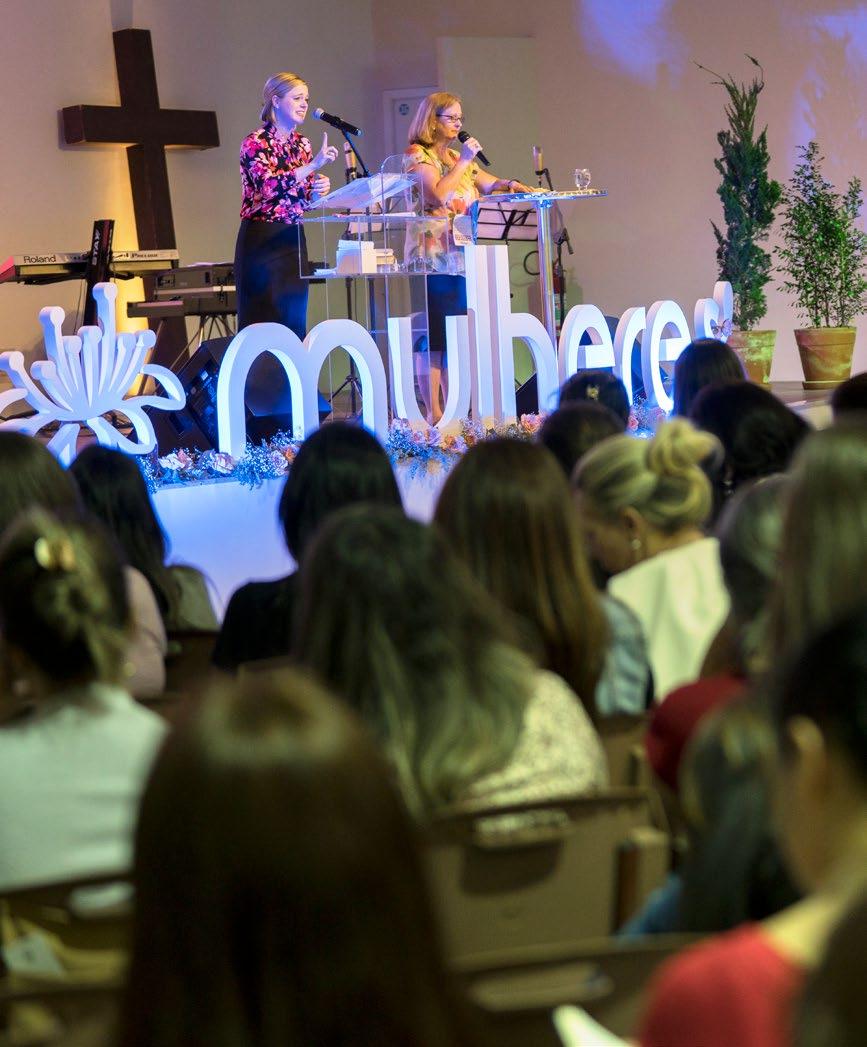
FIRST LOOK 8 Southwestern News Fall 2018
Professor Katie McCoy teaches Scripture to nearly 1,000 women at a fall 2017 women’s conference in Brazil. McCoy was joined by other women’s programs faculty from Southwestern, and they saw numerous women commit to reach their families, friends, and neighbors with the Gospel. “When I look back to that conference, it was really clear that the Holy Spirit had an appointment with the women there,” McCoy says. “They heard a little bit of Scripture, a little bit of truth, and the response was tenfold.”

swnews.org 9

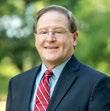

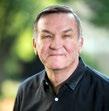






ANSWERING THE CALL
By Alex Sibley
Scripture teems with stories of God calling individuals to ministry. Some of these stories are quite dramatic (see Paul’s conversion in Acts 9), while others are more subtle (such as Peter and Andrew’s calling in Matthew 4). Those whom the Lord calls come from a variety of backgrounds—fishermen, tax collectors, farmers, shepherds, and, again in the case of Paul, even persecutors of the church. A common factor for each is that when God calls, the individual responds in obedience (though this might be delayed, as in the case of Jonah), and he serves the Lord through whichever ministry the Lord has assigned him.
The apostles preached. The prophets prophesied. The deacons served. Luke, apparently, took thorough notes of early goings-on in the church.
The singers sang. Musicians played instruments. Even Bezalel and Oholiab—whose names are perhaps not familiar even to the average Bible scholar—were specifically chosen by the Lord to “perform every work of an engraver and of a designer and of an embroiderer … and of a weaver, as performers of every work and makers of designs” for the tabernacle (Exodus 35:35). God calls; He appoints for certain tasks; His people answer.
Such is the case for every student who enrolls in Southwestern Baptist Theological Seminary. God has called them from various locations, vocations, and backgrounds to serve as pastors, preachers, teachers, singers, musicians, missionaries, and in many other Gospel-centered roles. These students have responded with obedience and so have come to Southwestern in order to prepare to serve God as best they can; to be ready for their tasks.
L.R. Scarborough, the second president of Southwestern Seminary and namesake for Scarborough College, once wrote, “Equipment of head and heart, and knowledge of the methods of work, is today an absolute necessity for the best work in the Kingdom of Christ.” Such is why these students
come—that they may be ready to perform “the best work” for the Kingdom.
So when God calls, His people come here. They come not merely to take classes, but to feed their souls with the Word of God and grow in their relationships with Him. Southwestern remains steadfast in its commitment to equip these God-called men and women not just educationally, but spiritually, that they may serve the Lord for a lifetime in furtherance of His Kingdom.
For this reason, Southwestern’s faculty play a vital role in the overall work of the Kingdom. For they not only teach courses to prepare students to serve in their respective fields, but they also nourish these students’ souls, fostering the spiritual preparation that these students—not to mention those to whom they will one day minister—so deeply need. In short, Southwestern’s professors guide students forward in their walks with the Lord, teaching them, discipling them, and encouraging them toward spiritual maturity.
This is the task to which God has called these professors. They come from diverse backgrounds, but they have answered God’s call in obedience, and now they are serving the Lord and furthering His Kingdom by equipping the next generation of ministers for Gospel service; for their “best work” in the Kingdom of Christ. This issue of Southwestern News shines a spotlight on just a few of these professors, highlighting God’s call on their lives, their obedience to it, and their resultant service unto Him within the world of theological education.
Obviously, more stories could be told of Southwestern’s numerous other faculty. But the hope is that these few profiles will provide a taste of what God is up to here at Southwestern. He has called, and Southwestern—students and professors alike—have answered.
swnews.org 11 STEADFAST
“Southwestern remains steadfast in its commitment to equip these God-called men and women not just educationally, but spiritually, that they may serve the Lord for a lifetime in furtherance of His Kingdom.”
MATT QUEEN
twitterbird @DrMattQueen
facebook /DrMattQueen
instagram DrMattQueen
email mqueen@swbts.edu

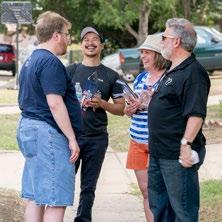

12 Southwestern News Fall 2018
“… [My calling] is now fully realized, being the Chair of Fire here at Southwestern and being a grace-gifted evangelist to help the church, to build the church, and to equip the church for the ministry of evangelism.”
CHAIR OF FIRE: Setting the Church Ablaze for Evangelism
By Alex Sibley | Photos by Kathleen Murray and Neil Williams
Matt Queen started evangelizing just seconds after he professed faith in Christ. During a Sunday evening worship service, the 8-year-old Queen was convicted to tears because of his sin, and so his parents, his pastor, and the chairman of deacons at his church explained the Gospel to him and led him to receive Christ as his Lord and Savior. Filled to overflowing with unsurpassable joy, Queen then ran up the aisle and out of the church, proclaiming to the children in the parking lot, “I’m saved! I’m saved! I’m saved!”
Though his Gospel presentations have become more refined in the 36 years since that day, Queen’s passion for proclaiming that “Jesus saves” has not dissipated. As the Chair of Evangelism at Southwestern Seminary, a grace-gifted evangelist for the church, and a father of two girls, Queen not only continues to proclaim the Gospel to the lost, but he also strives to instill this same passion in his students, the churches of the Southern Baptist Convention, and, above all, his family. As a result of this Spirit-driven ministry, countless individuals—including both of his daughters—have been encouraged to boldly proclaim the saving message of Jesus Christ to a lost world, and a myriad of sinners have experienced God’s redeeming grace as a result.
Following his parking lot proclamation on the day of his salvation, Queen continued sharing the Gospel whenever he could. He began accompanying his father in door-to-door evangelism at 8 years old, and he also shared the Gospel at school, leading two of his friends to the Lord in high school. When he later attended Southeastern Seminary, he and his future wife, Hope, spent part of their first date doing door-todoor evangelism.
Until that point, Queen knew only that God had called him to be a Gospel minister. During a chapel service at Southeastern, this call was further clarified. That day’s preacher, evangelist J. Harold Smith, concluded with a
challenge: “If you will commit to share the Gospel once a day for the rest of your life, I want you to stand up.”
“I got ready to stand up,” Queen says, “and the Holy Spirit said, ‘Matt, if you stand up, then you are surrendering your life to equip North America and North American churches for evangelism.’ I didn’t know what all of that meant, but it was really that specified. So I stood up to Smith’s call to share the Gospel, but also to the Spirit’s call to equip North American believers for evangelism.”
To prepare for this task, Queen enrolled in the Ph.D. program there at Southeastern while continuing to serve in local churches simultaneously. He graduated in 2009 and joined the faculty at Southwestern the following year. In 2014, he was officially installed as the L.R. Scarborough Chair of Evangelism, nicknamed the “Chair of Fire.”
Queen came to Southwestern with the express purpose of “setting the campus on fire for evangelism.” Fittingly, upon moving to Fort Worth, the first thing he and his wife did after unloading the U-Haul truck was doorto-door evangelism in their neighborhood. Since then, beyond teaching evangelism in the classroom, Queen has accompanied students in door-to-door evangelism in the community around Southwestern every week, first through Taking the Hill, then through No Soul Left Behind, Going the Second Mile, and now Everyday Evangelism.
“Passion for evangelism will never come from reading a book alone,” Queen says. “It will come by looking people in the face and seeing them convicted because of their sin.
“That’s why I think Southwestern is able to help lead in our convention in evangelism,” Queen says regarding the importance of Southwestern’s evangelism programs. “Because students are seeing the need for evangelism, because they’re actually seeing people who need the Gospel. For our students, it’s not just a tagline, it’s not just a banner that we have, but actually, we do reach the world by preaching the Word.”
swnews.org 13 STEADFAST
Queen has also been intentional in fostering evangelistic passion in his two daughters, Madison and Matia. Even while their children were young, Queen and his wife brought them along with them whenever they evangelized in order to both expose them to the Gospel as well as provide a model for evangelism when they eventually became believers. This intentional investment over the years paid off, as both Madison and Matia (now ages 13 and 7, respectively) have accepted Christ, and both are prolific sharers of the Gospel. (Read more here.)
“When my daughters got saved, they had already been evangelizing; it was always a natural thing,” Queen explains. “… So my daughters both have a passion to tell people about Jesus, and I don’t even have to prompt them now; it’s just natural.”
Such evangelistic practices—that is, investing in one’s family and reaching out to the community—are crucial for members of the local church, Queen says. “Unfortunately, there is not as much emphasis and intentionality on evangelism in all churches like there should be; that’s the reason we do it here at Southwestern,” Queen says. “And because of [our evangelism programs], now we have other churches who are coming along and saying, ‘We want to do this.’ So we’re sending students to go out with them and seeing that happen.

“At Southwestern, we’re not trying to do evangelism for the churches in this area, but we’re doing evangelism to try to spur them on so that they actually do evangelism.”
Thus, not only are the communities around Southwestern being reached, but the churches of Greater Fort Worth are being inspired to evangelize. In addition, as Southwestern students graduate and deploy to other churches throughout the country and around the world, they bring with them a passion for evangelism in order to set their churches ablaze with the same evangelistic zeal. In this way, as well as through directly teaching and preaching in these churches himself, Queen is able to fulfill the Spirit’s particular calling on his life—utilizing his passion for sharing the Gospel to encourage others in the evangelistic task.

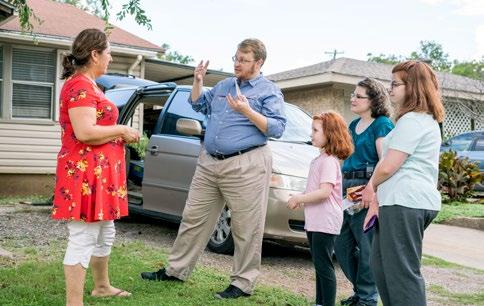
“I’m not the only evangelist in the Southern Baptist Convention by any means. But at least, in whatever roles I’m getting in the Southern Baptist Convention, I am able to exercise that gift,” Queen says. “There is a great fulfillment in that. … [My calling] is now fully realized, being the Chair of Fire here at Southwestern and being a grace-gifted evangelist to help the church, to build the church, and to equip the church for the ministry of evangelism.”

14 Southwestern News Fall 2018
WANT TO HEAR MORE OF DR. QUEEN?
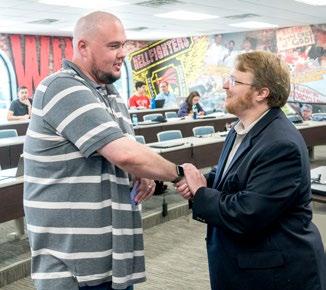
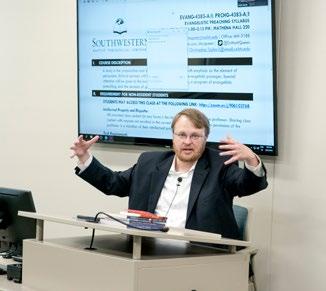
“At Southwestern, we’re not trying to do evangelism for the churches in this area, but we’re doing evangelism to try to spur them on so that they actually do evangelism.”


swnews.org 15
(click on the video above)
twitterbird @CarlJBradford80
email cbradford@swbts.edu
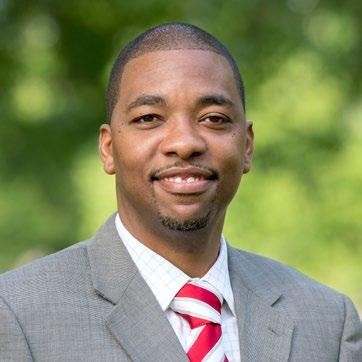
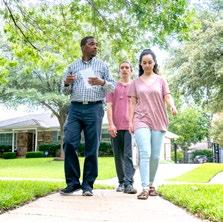

CARL BRADFORD 16 Southwestern News Fall 2018
“If you kill me, I’m going to heaven. But if you get convicted and get lethal injection, where are you going?”
never got over the fact that God saved me’:
THE PASSION FOR REACHING LOST SOULS
By Alex Sibley | Photos by Kathleen Murray and Neil Williams
Carl Bradford did not realize the man had a gun under his shirt. In New Orleans several years ago, Bradford was evangelizing with his church, and he noticed several men sitting in the back of a truck. He spoke to one of them in particular, introducing himself and stating his purpose.
“We’re going throughout the neighborhood, wanting to let people know what Jesus Christ has done for them,” Bradford said. “Do you mind me asking you if you are aware that Jesus Christ has died for your sins, and if you were to die today, do you know for sure where you would go?”
The man looked at Bradford, stood up, and raised up his shirt, revealing a gun tucked into his pants. He said, “You just come up to me talking about religion and God. What would happen if I just pull out this gun and shoot you?”
Without a moment’s hesitation, Bradford answered, “If you kill me, I’m going to heaven. But if you get convicted and get lethal injection, where are you going?”
The man sat back down. “Speak your peace,” he said.
Bradford shared the Gospel, but the man did not accept Christ. Hours later, after Bradford had returned home, he thought, “What was I thinking? I could have been killed!”
But Bradford found solace in the Scripture that says, when followers of Jesus are handed over to kings and judges, “the Holy Spirit will teach you in that very hour what you ought to say” (Luke 12:12). “So I believe that the Holy Spirit just prompted me to say those words and not to be in fear,” Bradford says.
As Southwestern Seminary’s new instructor in evangelism, Bradford brings experiences like this to his teaching ministry to students. “You will have those types of experiences,” he says. “They are few and far between; most of the time, people will
listen to what you have to say. But even in those situations, God is with us, and we need to have the comfort of the Holy Spirit, that He is there with us and will give us the words to say.”
As he begins his first semester on Southwestern’s faculty, Bradford looks forward to sharing experiences like this with students in order to equip them for the challenges they will face in ministry. Such teaching matters, Bradford says, because Christians must not shrink back from evangelism, for evangelism is “a catalyst for everything else that we do in Christianity.” Therefore, he says, passion for evangelism and wisdom in evangelism are essential tools for the minister’s tool belt, and he aims to equip his students with these and as many other tools as possible.
Bradford’s own passion for evangelism stems from his salvation. At the age of 21, while Bradford attended a church service at the invitation of his grandmother, he found himself distracted by a girl his age with whom his cousin had attempted to set him up. Despite being “in and out” of the sermon, however, he focused long enough to hear the preacher say, “If you die today or tomorrow, are you sure that you would go to heaven?”
Having lost his brother when he was 14 and his father at age 18, death was a reality for Bradford, and he knew that no one was guaranteed another day. So, in response to the preacher’s Gospel invitation, Bradford accepted Jesus Christ as his Lord and Savior.
Immediately, he had the desire to evangelize everywhere he went. “I never got over the fact that God saved me,” Bradford says, “that the God and Creator of this universe cared enough to personally die on a cross for me and save me. … I can’t hold this; I need to tell everyone about this.”
swnews.org 17 STEADFAST
‘I
One day, Bradford saw a black-and-white excerpt from a Billy Graham crusade on TV and thought to himself, “I could do that. … That’s what I love to do.” For a time, however, Bradford was distracted by a desire to obtain a high-paying job. But eventually, his pastor asked him, “If money was not an issue, what would you see yourself doing?” Bradford answered, “That’s easy. I would go around like Billy Graham and preach crusades.”
Immediately after this conversation ended, Bradford walked out to his car convicted, as he had just stated that he felt called by God to be an evangelist but was instead pursuing a job with a high salary. So, rather than focus his efforts on earning money, he decided to obey the Lord and follow his passion by enrolling in Southwestern Seminary.
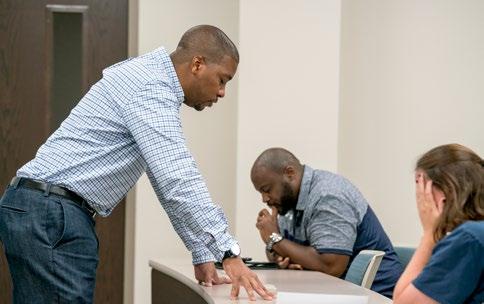
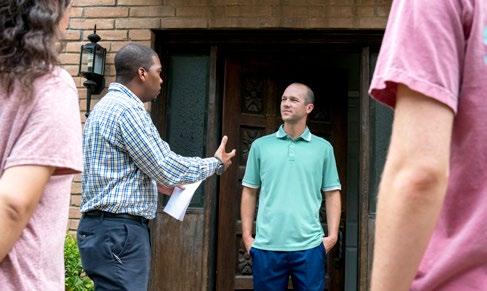
Bradford completed his Master of Divinity in 2011, and after serving at a church plant for roughly a year and a half, he returned to Southwestern in 2013 for Ph.D. work. Concurrently with his doctoral studies, he also served in an interim position in a local church.


As Bradford began teaching courses at Southwestern in the fall 2018 semester, he drew not only from his knowledge of the Word and passion for the Gospel, but also from his experience in local churches in order to equip students for ministry. “Having
been a part of a church plant and worked in the local church, one thing is consistent—there is a lack of involvement in evangelism [by the congregation], and I find that that’s due to an incorrect philosophy of evangelism,” he says.
Bradford, therefore, aims in his classes to create a zeal and a passion in students for evangelism and lost souls, as well as to create a foundation for their philosophy in evangelism. In other words, he wants to pass along to students what God has entrusted to him, so that they can then pass it along to their congregations.
“I want to be the type of professor who not only teaches theology and teaches the practices of evangelism,” Bradford says, “but is also able to go out with students, hit the streets, knock on doors, and let them see that this is a work that is important to me, it’s important to the seminary, and it’s crucial to our convention if we want the churches to continue to baptize and continue to win souls for Christ.
“I want to give students the tools and resources they need to actually go out into the church and be able to carry out the work of evangelism. I find those are the things that are needed within the church, and I pray God uses me to help the future leaders be helpful to the churches in that way.”
18 Southwestern News Fall 2018
WANT TO HEAR MORE OF DR. BRADFORD?
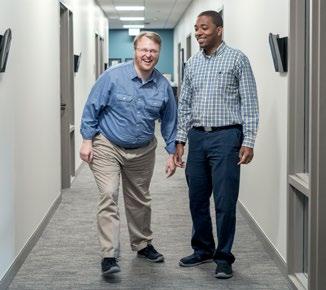


“I never got over the fact that God saved me... That the God and Creator of this universe cared enough to personally die on a cross for me and save me. … I can’t hold this; I need to tell everyone about this.”

swnews.org 19
(click on the video above)
twitterbird @dr_mckellar
facebook /drmckellar
email mmckellar@swbts.edu
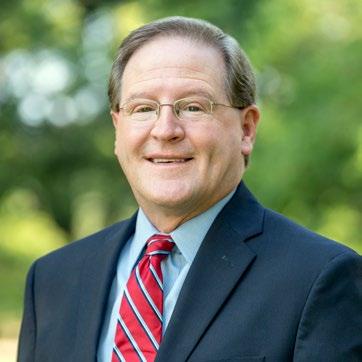

drmmckellar.wordpress.com

20 Southwestern News Fall 2018
“When God calls you to preach, he puts a real fire in your bones. You want to preach!”
MATTHEW MCKELLAR
PASSING THE BATON: training the called to preach God’s Word
By Katie Coleman | Photos by Kathleen Murray and Neil Williams
Called to ministry as a high school student, Professor of Preaching Matthew McKellar did not hesitate to act on that calling with enthusiasm. Although it would be several more years before he pastored a church, McKellar was eager to preach. He seized every opportunity with gladness, getting his first experience preaching in a nursing home during his high school years.
McKellar now has more than 30 years of preaching experience in roles as senior pastor, interim pastor, and guest preacher. He pastored a church in Tyler, Texas, for more than 20 years before joining the Southwestern Seminary faculty in 2009. Now, he teaches and mentors a new generation of students who have also answered the call to ministry.
Although it has been many years since McKellar started out in ministry, he says that, particularly as a young preacher, practice was one of the best methods for learning more and improving his preaching. With this in mind, he and other preaching faculty formed a church partnership program that has provided students opportunities to step out of the classroom and preach to congregations.
Southwestern has since partnered with about 20 churches in the Dallas-Fort Worth area willing to offer three or four opportunities for students each semester. With more than 100 preaching opportunities available to students in a year, there is no reason students cannot start getting experience while in school, McKellar says.
“For the guys who have had little or no preaching experience, you have to start them somewhere and get them in a church where they can be loved, received warmly, and encouraged,” McKellar says. “It really sets the trajectory of their preaching experience.”
McKellar says his hope for students is that they will make the most of their time in seminary and seize these preaching opportunities so that they may be better equipped for the ministries to which God might call them in the future. “When a student comes to Southwestern, I tell him that I cannot guarantee a place to pastor,” McKellar says, “but I can guarantee that if you come, you can access immediate preaching opportunities.”
In addition to the preaching courses he teaches both online and on campus, McKellar serves as a supervisor to Ph.D. and D.Min. students. McKellar says he values this role, as it provides him the opportunity to guide and encourage students during the doctoral process.
Recalling his own Ph.D. experience, McKellar says he understands the challenges that accompany doctoral work while balancing family, work, and research responsibilities. But as new students come through the program each year, McKellar says he is encouraged by the persistence of these students and their desire to pursue ministry and theological education.
swnews.org 21 STEADFAST
McKellar’s approach to supervising is in part a reflection of his own seminary experience. After graduating from Baylor University in 1982, he went on to pursue a Master of Divinity (1985) and Ph.D. (1991) at Southwestern Seminary. He recalls that his professors went out of their way to make themselves available, answer his “endless questions,” and even take an interest in his life outside the classroom.
Like those professors who played an important role in his seminary career and later ministry, McKellar tries to invest in his students as well as young pastors. For preachers, McKellar says, Sundays can come and go so quickly that they must have people who will challenge and support them.

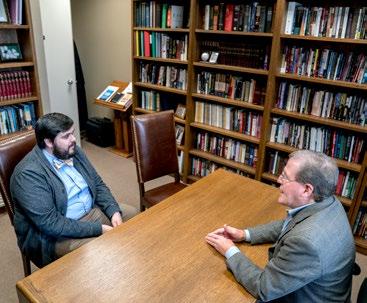


“The opportunity to guide and encourage students is a real delight,” McKellar says. “I don’t have all the answers, but I have been where they are going, and I do what I can to steward them through that and guide them.”

22 Southwestern News Fall 2018
Click here to explore PreachingSource.com
WANT
“When a student comes to Southwestern, I tell him that I cannot guarantee a place to pastor, but I can guarantee that if you come, you can access immediate preaching opportunities.”




swnews.org 23
TO HEAR MORE OF DR. MCKELLAR?
(click on the video above)
twitterbird @ckylewalker
facebook /walke113
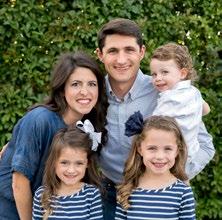
email kwalker@swbts.edu


24 Southwestern News Fall 2018 KYLE WALKER
In his role as a preacher, a preaching professor, and a writer on the subject of preaching, Walker now sees his God-given task as the pursuit of a resurgence in textdriven preaching in churches around the world.
HARD WORK IN SEARCH OF THE PRIZE: looking toward a resurgence in text-driven preaching
By Julie Owens | Photos by Kathleen Murray and Neil Williams
Kyle Walker has a deep passion for the outdoors— “enjoying God’s creatures”—and using outdoor activities as a platform to introduce generations of men to the Gospel. “Like hunting, living life is a pursuit. Both involve a pursuit that can be very challenging, but very rewarding,” he says. “God made man to pursue Him. God has never stopped pursuing man. That is the Gospel.”
Hunting “clearly parallels the ministry,” Walker says, “to be patient and intentional, understanding the situation, putting yourself in an advantageous position.” And both involve “hard work in search of the prize,” he adds.
Like sharing the truth about Christ from a pulpit, sharing the Word of God with his hunting partners is a beloved mission. “It gives me a platform for dialogue and conversations. It’s where discipleship takes place,” Walker says.
Walker’s eye has been on preaching for nearly as long as he can remember. Through his life’s twists and turns, Walker has been unswerving in the single most important thing—service to God, which has pervaded his life since the age of 9. He was dutifully walking the path to a career of preaching when God steered him to another role, that of vice president for student services at Southwestern Seminary. Today, all who pass through Southwestern benefit from his devotion to this service.
A 2007 graduate of the University of Alabama with a Bachelor of Science in Organizational Leadership, Walker first sensed God’s call to preach as a teenager. That call led him to Southwestern as a student in 2007.
“God had called me to preaching, and I needed training,” Walker says. When visiting Southwestern as a prospective student, “God gave me a peace about this place,” he recalls.
When Walker enrolled in Southwestern in pursuit of a Master of Divinity, he was “fully convinced that eventually [he] would pastor a church.” But God had other plans and would call him to a different type of service. “I said, ‘God, show me my people,’” Walker says.
Pursuit of a fast-track academic career path was never his goal, but Walker’s leadership, enthusiasm, and loyalty proved invaluable to Southwestern. He completed his M.Div. in 2010, and he was named Southwestern’s director of admissions that same year. Three years later, Walker was appointed to the newly created position of dean of students. Then, in 2015, he completed his Ph.D. in preaching and systematic theology and joined the Southwestern faculty as assistant professor of preaching.
In 2017, Walker was called to serve as vice president for student services and was unanimously approved by the executive committee of the board of trustees. “It was then that I said, ‘God, I’m serving here until you call me elsewhere,’” he says. The new role allowed him “to continue along the path the Lord has ordered for me.”
Though not pastoring a church as he had anticipated, Walker nevertheless speaks frequently at local churches, revivals, and student camps. Earlier this year, he traveled to Myanmar after a pastor from that country visited the Southwestern campus and requested that Walker come and help train pastors there. Local people were instructed in textdriven preaching—preaching that adheres to the substance, structure, and spirit of the biblical text “and its credibility as the inerrant Word of God,” Walker says.
swnews.org 25 STEADFAST
Walker and Shane Kirby, an M.Div. student at Southwestern, also went hunting with the local men. “Hunting allowed us to speak to a lot of men who normally wouldn’t have come to church,” Walker says. (Read more about Walker’s trip here.)


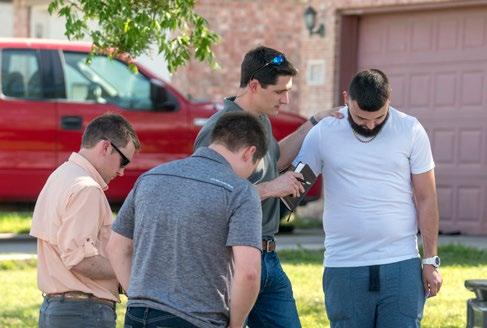
Walker’s role in academia has also allowed him to influence the preaching of the next generation. In addition to his role as teacher, Walker has penned a new book entitled Let the Text Talk: Preaching that Treats the Text on its Own Terms.

This work is an extension of Walker’s devotion to preaching. Its purpose is twofold: It details how text-driven preaching changed him, and it fills a critical niche in teaching text-driven preaching.
“There are other resources available, but nothing that codifies what we are teaching at Southwestern,” Walker says. Let the Text Talk is intended as “a practical manual for students” that outlines Southwestern’s approach to text-driven preaching and walks readers through the construction of a text-driven sermon.
Furthermore, Walker says, “It’s meant to give people an idea of whose shoulders we are standing on.” The book is an update and revision of a work by Southwestern’s first preaching professor, Jeff Ray, that was published in 1940. The principles of letting the text of Scripture drive all aspects of the sermon are as applicable today as they were in 1940, Walker says.
In his role as a preacher, a preaching professor, and a writer on the subject of preaching, Walker now sees his God-given task as the pursuit of a resurgence in text-driven preaching in churches around the world. “It’s a return to the Word of God,” he says. “Scripture is the authority.”
Like hunting, such service unto the Lord is challenging but may ultimately prove rewarding, and Walker predicts that this resurgence is on the horizon for Christianity.
26 Southwestern News Fall 2018
“Like hunting, living life is a pursuit. Both involve a pursuit that can be very challenging, but very rewarding.


God made man to pursue Him. God has never stopped pursuing man. That is the Gospel.”


swnews.org 27
WANT TO HEAR MORE OF DR. WALKER?
(click on the video above)
twitterbird @richardaross
facebook /rossrichard
email rross@swbts.edu

richardaross.com

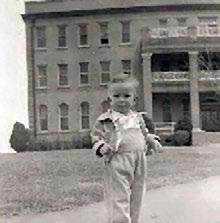
28 Southwestern News Fall 2018
RICHARD ROSS
“When I look into the faces of the future youth leaders in my classes, I continually am aware that they will walk beside the teenagers and families whom I love so much. The seminary has provided an amazing platform to impact a generation of teenagers, through their pastors and leaders, in the name of Jesus.”
MAKING LIFETIME DISCIPLES: 50 years of investing in youth ministry
By Julie Owens | Photos by Kathleen Murray and Neil Williams
In June 2019, Richard Ross will celebrate 50 years of exclusive focus on youth ministry and teenagers. It marks the month that, in 1969, he became a part-time youth pastor in his hometown of San Angelo at just 19 years old. From there, he proceeded to serve in local-church youth ministry for 30 years—a period that included 16 years of service as the youth ministry consultant at LifeWay Christian Resources. He also co-founded the international True Love Waits movement, with the first promises of purity made by members of Ross’ youth group in 1993.
Ross’ life focus during that time was winning, discipling, and mobilizing teenagers through ministry directly to them as well as to their parents, senior pastors, and other youth leaders. His explicit goal was to introduce teenagers to Jesus and then disciple them into believers who would, for a lifetime, love God, love people, and make disciples for the glory of God. For Ross, this was nothing less than the church’s hope for the future.
The year 2000 marked “the beginning of another grand chapter” of Ross’ life, for then he accepted the call to become professor of student ministry at Southwestern Seminary. But though his specific role shifted from directly investing in teenagers himself to preparing the next generation of youth ministers to do the same, his passion and focus went unchanged.
“I was just as committed to teenagers and youth ministry as I had been in every season of my life,” Ross says. “But receiving a call from Southwestern gave me a new way to look at that calling. I began to see a ministry to multitudes of teenagers and their families—as I equipped the youth pastors who would work with them directly.”
In his nearly 20 years at Southwestern, Ross says, that perspective has permeated everything he has done. “When I look into the faces of the future youth leaders in my classes, I continually am aware that they will walk beside the teenagers and families whom I love so much. The seminary has provided an amazing platform to impact a generation of teenagers, through their pastors and leaders, in the name of Jesus.”
Ross’ years of service in the local church prior to coming to Southwestern fostered a deep love for teenagers and revealed to him several necessary aspects of effective youth ministry. Specifically, Ross learned that, in order for teenagers to become lifetime disciples of Jesus, they must be reared by godly parents, engage in a rich web of relationships with the full congregation, and participate in a Bible-drenched youth group. Youth leaders, then, must devote time and energy to all three of these areas, Ross says.
This notion serves as the basis of not only Ross’ teaching at Southwestern, but also one of his definitive works, Youth Ministry That Lasts a Lifetime. In this book, published in 2017, Ross proposes “a radically new model” of youth ministry geared toward investing in whole families, rather than just the individual students themselves, and getting youth involved in the whole life of the church, all while continuing to promote traditional student ministry.
“The voice of Scripture outweighs any other considerations,” Ross writes. “But it is interesting to note that the most reliable studies regarding lifetime faith coalesce around these same three arenas.”
“The great majority of our youth pastors love King Jesus supremely, embrace their calling fully, and do their work tirelessly,” he continues. “But by doing those things the church
swnews.org 29 STEADFAST
expects them to do, the great majority of church teenagers are not becoming world-changing disciples. Everyone knows the definition of insanity. Clearly the time to move toward change is now.”


Ross’ passion for this type of ministry drives him in his dayto-day work at Southwestern. “I almost jump out of bed every morning at 4 a.m., excited about getting to the seminary,” he says. “I absolutely love teaching youth ministry to the future leaders of the church.”
Ross believes “the next great revival” of the church will be youth-led. “Those in ministry with a young generation may get front-row seats,” he says. “I pray that includes me.”

“In recent centuries,” he continues, “God has moved through a young generation to spark revival in the church and awakening in the culture. We are in dark days and in great need of sweeping revival. A sovereign God can do as He pleases, but I have a hunch that He will raise up collegians and teenagers in our day to spark that next great revival.”
Scripture is replete with examples of God using young people to accomplish great things, Ross says. In his latest book, 31 Truths to

Shape Your Youth Ministry, he writes, “Teenagers in the Bible usually functioned as adults and were viewed as adults. Given the practices of the day, the mother of Jesus likely was a younger teenager. The Bible may suggest that 11 of the 12 apostles were older teenagers. King Uzziah, King Josiah, King David, Daniel, Joseph, Samuel, Samson, Esther, and others demonstrated adult maturity in their teenage years.”
“Many teenagers are primed and ready to do hard things, to take on grand challenges,” Ross concludes. “As very young adults, they are ready to join Paul in saying, ‘For to me, to live is Christ and to die is gain’ (Philippians 1:21).”
As he nears the completion of 50 years of focusing on teenagers, Ross says his mind is filled with fresh thoughts about youth ministry. “Right now, I am designing a new course as an outlet for some of that thinking,” he says. “And soon, I will begin writing a new curriculum for teenagers on the supreme majesty of King Jesus. I am certain I will keep a laser focus on ministry with teenagers until the day I graduate to Glory.”
30 Southwestern News Fall 2018
WANT TO HEAR MORE OF DR. ROSS?


“God has moved through a young generation to spark revival in the church and awakening in the culture. We are in dark days and in great need of sweeping revival. A sovereign God can do as He pleases, but I have a hunch that He will raise up collegians and teenagers in our day to spark that next great revival.”
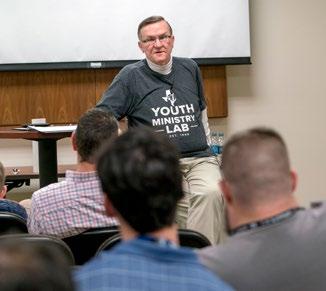
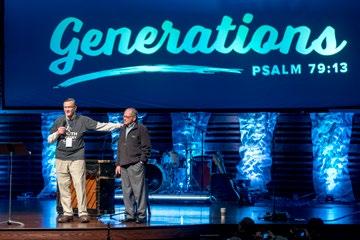
swnews.org 31
(click on the video above)
twitterbird @Katie_McCoy
facebook /kmccoy8611
instagram Katie_McCoy

email kmccoy@swbts.edu

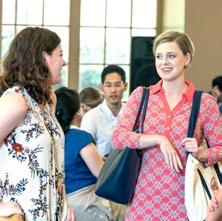
KATIE MCCOY 32 Southwestern News Fall 2018
“To have the opportunity to be someone whom they let into their lives enough to influence them is a real privilege. My prayer is that, within their hearts, they would be convinced of the truth of the Gospel and what it means for their lives and how that permeates every area of life.”
ENCOUNTERING THE LIVING GOD THROUGH HIS LIVING WORD: teaching and discipling students to love God
with their minds
By By Katie Coleman | Photos by Kathleen Murray
Katie McCoy did not always plan to serve as a seminary professor, nor did she spend much of her early life planning to seek a seminary degree. As a young college student, McCoy pursued a music degree and was even accepted into a music program in St. Louis, Mo.
After her spring 2007 college graduation, McCoy started a job as her church’s ministry assistant as a way to earn some money before graduate school. But in those few months of serving in the church, McCoy realized that the Lord had a different path for her. “God called me to ministry and put this on my heart, and He used serving in the church to do that,” she says.
McCoy was still unsure of what the future held, but she was confident that seminary was the next step for her. “Sometimes it is as simple as saying, ‘I don’t know what it is I’m supposed to do; I just know I’m going to need a a Ph.D. to do it,’” McCoy says. “That was all I had. But like so many other things in our Christian lives, you don’t need the next 12 steps; you need the next one.”
After some research, McCoy enrolled at Southwestern Seminary, where she eventually earned a Master of Divinity in women’s studies (2011) and a Ph.D. in systematic theology (2016). In the 11 years since she arrived at the Fort Worth campus, McCoy has seen the fruit of her obedience to God’s calling. She is a systematic theologian, was elected to the Southwestern faculty in 2016, has devoted much of her research to women’s and cultural issues, and personally invests in students to see them fall more in love with the Lord.
During her master’s-level studies, McCoy says God began to instill in her a passion for topics that would eventually
become her area of research and the topic of her dissertation. In her study of Old Testament law, she realized that there were many examples of what she says are God’s created parameters for the protection of women.
“What I discovered through [my studies] was all of these social protections that God had placed within this ancient culture,” McCoy says. “And when you learned the ethical pattern of them, you saw that there was also a defense of women’s dignity. It was remarkable to see how God actually created all these safeguards that protected women from being exploited.”
McCoy’s passion for this topic, as well as other cultural issues, only developed more throughout her studies. As she began to pursue Ph.D. work, she realized that there was a significant lack of literature from an evangelical perspective on the topic.
“There was this untapped reservoir of really showing our justice-keeping God and the God who defends the innocent and the God who hates exploitation,” McCoy says. “It just makes you want to love God more, to study His law, and to see His heart through it.”
As she pursued Ph.D. work and began to write her dissertation (titled Old Testament Laws Concerning Particular Female Personhood and Their Implications for the Dignity of Women ), McCoy says her love for the Lord and her desire to worship Him only increased as she learned more about His character. “That should be the result of all of our study,” McCoy says. “We want to follow Him with everything we have. If we are not ending with that, we are not doing it right.”
swnews.org 33 STEADFAST
Now assistant professor of theology in women’s studies for both the seminary and Scarborough College, McCoy hopes to instill in her students a passion for their studies as they “encounter the living God through His living Word” and learn to love God with their minds.
In her courses, students often have to grapple with difficult cultural issues, McCoy says. But one of her favorite moments is when students return to her to share stories of how they have been able to engage in conversations and articulate their theological position on difficult topics. McCoy says that, oftentimes, students are able to do this because they have already thought through these topics critically in the security of community.

Because of this, McCoy says another favorite aspect of her job is participating in discipleship groups at Southwestern, as well as the many after-class conversations with students who share what they have learned and what is going on in their lives outside of class.

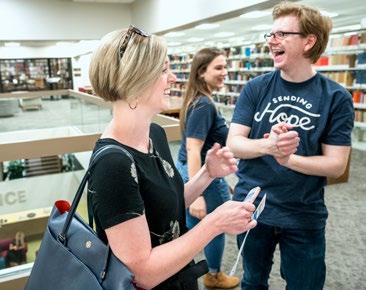

“Frankly, that is when I know that what I’m doing here matters. To have the opportunity to be someone whom they let into their lives enough to influence them is a real privilege,” McCoy says. “My prayer is that, within their hearts, they would be convinced of the truth of the Gospel and what it means for their lives and how that permeates every area of life.”

34 Southwestern News Fall 2018
Click here to explore BiblicalWoman.com
WANT TO HEAR MORE OF DR. MCCOY?

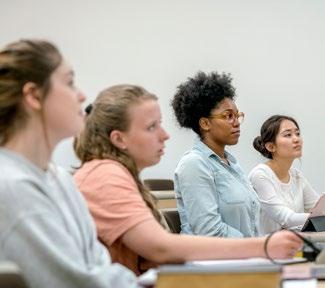

“We want to follow Him with everything we have. If we are not ending with that, we are not doing it right.”

swnews.org 35
(click on the video above)
YOON-MI LIM

facebook /yoonmi.lim
email ylim@swbts.edu


36 Southwestern News Fall 2018
“As an educator at the seminary, my goal is to not just train world-class performers, but to also train and equip them to serve the church and His people effectively through music.”
AN INSTRUMENT FOR THE LORD: serving the church and honoring God through musical excellence
By Katie Coleman | Photos by Kathleen Murray and Neil Williams
Mozart once referred to the organ as the “king of instruments.” Its player could produce rich tonal sounds, filling a space unlike any other instrument. The organ’s history dates back centuries, providing concertgoers and church members a powerful musical experience.
Associate Professor of Organ Yoon-Mi Lim says the instrument’s dynamic range is just one of the many reasons she loves the instrument. The instrument, also nicknamed the “one-man orchestra” in the early 20th century, is often capable of producing the sounds of multiple orchestral instruments. Additionally, Lim says she loves the instrument for its use in congregational settings throughout history. “In its relationship to the church, I love how it can enhance the worship experience for congregational singing,” she says. “The organ offers a wide range of tonal variety; the colors are endless. How we mix those colors to create countless tempers is what makes the organ a beautiful instrument.”
Lim is well-regarded in her field, is recognized by her peers, and has won awards in competitions including those sponsored by the American Guild of Organists (AGO). She is invited to perform both locally and internationally; most recently, she performed alongside five other organists at the AGO Dallas chapter’s centennial anniversary concert at the Meyerson Symphony Center in Dallas. Now, as the Albert L. Travis Chair of Organ in Southwestern Seminary’s School of
Church Music, she gets to combine her two passions: music and teaching.
Born and raised in South Korea, Lim’s second home was the church. Her father was a Presbyterian pastor and got her started on the piano at a young age so that their church could have an accompanist. Lim came to love the piano as well as music’s role in the church.
“Church was my home,” Lim says. “It was my playground, and the piano was my toy.”
As she looked at college options, Lim’s parents encouraged her to take organ lessons. It was an instrument that, although similar to piano in its requirement for technical keyboards skills, had many more elements and techniques. Lim took to the instrument and went on to receive both her bachelor’s and master’s degrees in music from Yonsei University in Korea. She later earned her Doctor of Music in organ performance and literature from Indiana University.
After Lim completed her doctoral degree in 2008, the Lord brought her to Southwestern Seminary. She was appointed associate professor of organ in the School of Church Music and now teaches courses in organ literature, organ pedagogy, service playing, and applied organ.
Even as a well-regarded performer, Lim says that she, like any musician, is always striving to improve her skill set and craft. Learning is a lifelong process, she explains; there is always something to improve upon and add to one’s repertoire.
swnews.org 37 STEADFAST
MUSICAL EXCELLENCE. SPIRITUAL INTEGRITY.


Lim hopes to pass on that passion for learning to her students. These students come from a variety of backgrounds, all with different plans for their future musical careers. But although they differ in the application of their craft, they all have one common goal: to serve and honor God. Their curriculum is designed in such a way, Lim explains, that they will be ready to serve in any church context, teach, or perform in any setting, ranging from traditional to contemporary styles.
“As an educator at the seminary, my goal is to not just train world-class performers, but to also train and equip them to serve the church and His people effectively through music,” Lim says. “We are training the students to be ready to perform in any one of these places and be ready to work together and use their skills in the setting as servants for the Lord.”
Lim says she has loved her 10 years of service at Southwestern and is excited to see what is next for her students in music and ministry. “I enjoy what I do, and I get to do what I love. That doesn’t happen often and is a very rare blessing,” she says regarding both her love for music and for teaching. “I love both and am in the perfect place to do both.” swbts.edu/churchmusic


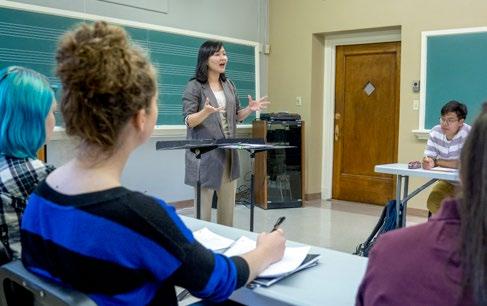
38 Southwestern News Fall 2018
WANT TO HEAR MORE OF DR. LIM?
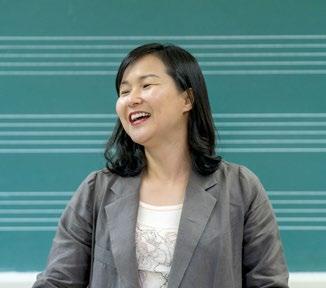
“The organ offers a wide range of tonal variety; the colors are endless. How we mix those colors to create countless tempers is what makes the organ a beautiful instrument.”



swnews.org 39
(click on the video above)
facebook /nathan.burggraff.77
email nburggraff@swbts.edu


nathanburggraff.com
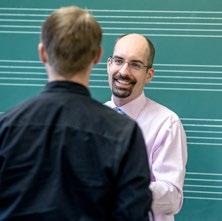
40 Southwestern News Fall 2018
“We need to be singing our theology.
When we do that, the songs that we teach the congregation and the songs that they learn, they can then take with them.”
NATHAN BURGGRAFF
SINGING OUR THEOLOGY: leading God’s people in unhindered worship
By Alex Sibley | Photos by Kathleen Murray and Neil Williams
In Colossians 3:16, Paul exhorts the church at Colossae to let the Word of Christ dwell richly within them, “with all wisdom teaching and admonishing one another with psalms and hymns and spiritual songs, singing with thankfulness in your hearts to God.” Nathan Burggraff, assistant professor of music theory at Southwestern Seminary, notes that when exegeting this verse from a musical perspective, people often focus on “psalms and hymns and spiritual songs” as different types of songs that can be sung in worship. But Burggraff himself focuses on a different part of the verse—“teaching and admonishing.”
“We need to be teaching through the songs that we’re singing,” he says. “We need to be singing our theology. When we do that, the songs that we teach the congregation and the songs that they learn, they can then take with them.”
Burggraff says that if music leaders within the church do not think critically about the songs they choose for congregational worship, then they waste the opportunity to teach theology through song in the church. The significance of this goes beyond just the worship services, Burggraff says, because people tend to remember songs better than they remember sermons.
“I don’t remember a single message that I heard when I was 8 years old, but I can remember some of the songs that I learned,” he says. “And so we have the opportunity to put good theology into those memorable tunes so that people can take that with them. So we shouldn’t take that lightly.”
As a professor in Southwestern’s School of Church Music, Burggraff passes this philosophy for music ministry along to his students, striving to equip them to be both musically skilled and theologically oriented; to see the crucial role music ministers play in the ministry of the local church; and to be capable of effectively leading congregations—rather than hindering them—to worship the Lord.
“It is important for us to show that we care about that rigorous musical training for these leaders of our churches,” Burggraff says. “It’s important to show that we are trying to train students to the best of our ability both musically and theologically.”
Burggraff joined the Southwestern faculty in 2015 after serving in local churches for many years. During his master’s and doctoral studies at Eastman School of Music in Rochester, N.Y., for example, Burggraff spent six summers traveling to over 70 churches as an itinerant concert pianist.
By that point, Burggraff had already developed a passion for combining theology with music, so whenever he played hymns, he also presented the lyrics and related Scripture passages via PowerPoint to the congregations.
“I had a full PowerPoint with each arrangement so that people could focus on the lyrics, because so often, for instrumental performance in the church, if they don’t have the lyrics in front of them, it’s just listening to the performer and not actually focusing and meditating on the hymns themselves,” Burggraff says. “So my goal was much less about the performance and more on focusing and meditating on Scripture and the hymn lyrics.”
Burggraff also served for three and a half years as a music administrator at a church in Rochester. Through this position, he learned about the many challenges that music ministers face, and this experience now informs his teaching at Southwestern.
“I’m now teaching undergrads and graduate students, a lot of whom are working in churches and are facing the same challenges that I faced while I was working at that church in New York,” he says. “And so that has actually helped me to talk with them and give them advice on things that worked for me and things that didn’t work for me as I saw firsthand what goes on behind the scenes in music ministry.”
swnews.org 41 STEADFAST
Some of these challenges included choosing songs for worship services as well as determining the best way to introduce them to the congregation. Burggraff’s solution to this latter challenge was implementing a “song of the month” that fit with the theme of the month for the church. After finding a relevant, theologically rich song, Burggraff would lead the congregation in singing it once a week for four weeks (with both the music and lyrics presented on the PowerPoint screens) so that they could learn the words, melody, and rhythm. When the month ended, the song could then be implemented into the church’s regular worship services.
“The three and half years I was there, they learned 40 new songs,” Burggraff says. “While you may not hear these songs on the radio, they have good theology to them, and they’ve actually become some of the core songs that the congregation still sings.”
Beyond learning practical things such as this through his time in the local church, Burggraff also observed—both before and after joining Southwestern—something crucial for music ministers to understand—that is, the importance of finding music that allows the congregation to participate in the worship. “The main thing that I’m hearing from congregants is that they want to sing, but they’re being hindered by the songs that we’re choosing,” he says.
“If it’s too rhythmically difficult,” Burggraff explains, “they don’t know when to sing where, and so they struggle with matching
what the praise team is doing. If the song is put too high or too low, the average congregant can’t hit those high notes or those low notes, and so they stop singing. If there’s poor theology or shallow theology, it just becomes mundane and, in a sense, vain repetition, and so they stop singing.
“So it’s important to have a music minister/worship leader who knows how to choose songs that work for the average congregant, that allow them to then sing their theology without musical hindrances.”
This has become something about which Burggraff is particularly passionate, and he says it is one of the reasons that Southwestern needs the School of Church Music—because he and his fellow faculty members strive to teach their students not just good theology but also musical excellence so that they can facilitate corporate worship.


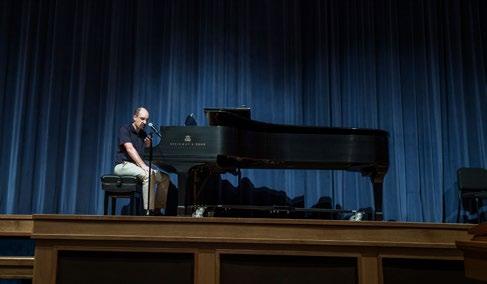

“Congregations want somebody on stage who allows them to participate,” Burggraff says. “That’s why it’s so important for the worship leader to have proper training.”
By choosing songs that work both theologically and musically, as Burggraff and the other School of Church Music faculty teach them, these students can go on to effectively lead their congregations to sing “with thankfulness in [their] hearts to God” out of the overflow of the Word of Christ dwelling richly within them.
42 Southwestern News Fall 2018




TO HEAR MORE OF DR. BURGGRAFF?
WANT
swnews.org 43
(click on the video above)
“Congregations want somebody on stage who allows them to participate. That’s why it’s so important for the worship leader to have proper training.”
twitterbird @myarnell
facebook /malcolm.yarnell
instagram malcolmyarnell
email myarnell@swbts.edu

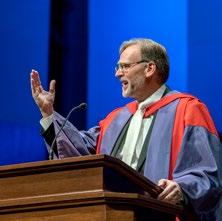
baptisttheologians.blogspot.com

44 Southwestern News Fall 2018
“I am literally called to be a ‘pastortheologian.’ Not in the sense of the ‘pastor as theologian’ but that of the ‘theologian as pastor,’ or ‘a pastor to pastors.’”
MALCOLM YARNELL
PASTOR-THEOLOGIAN: a minister to ministers
By Julie Owens | Photos by Kathleen Murray and Neil Williams
Think of the great theologians in Christian history, and our minds will inevitably gravitate to those theologians who were pastors:
“Chrysostom, bishop of Constantinople; Augustine, bishop of Hippo; Luther, preacher of Wittenburg; Calvin, pastor in Geneva; Smyth, pastor among, successively, Anglicans, Puritans, Separatists, and Baptists; Knollys and Keach, Baptist pastors in London; Gill, pastor in London; Edwards, pastor in Massachusetts; Fuller, pastor in Soham and Kettering; Backus, pastor in Massachusetts; Furman, pastor in Charleston; and Spurgeon, pastor in London. Need I continue?”
In this paper presented to the Baptist World Alliance in July 2001, Malcolm Yarnell resolutely explained why he chose to follow in the footsteps of these spiritual giants from the past—that is, to be a pastor-theologian. “I want to glorify my Lord Jesus and influence as many people as possible to do the same,” he wrote. “That is why God has graciously and unexpectedly called this unworthy servant to be a pastor to pastors, a minister to ministers.”
“I am literally called to be a ‘pastor-theologian,’” he explained. “Not in the sense of the ‘pastor as theologian’ but that of the ‘theologian as pastor,’ or ‘a pastor to pastors.’” A pastor-theologian, he wrote, can evaluate both Scripture and the needs of a congregation to determine “what God’s Word means to us today.”
How feasible is it to be both a scholar and a pastor? As Yarnell noted, throughout the church’s history, the roles of pastor and theologian have been deeply intertwined. For Yarnell, this is a lifelong calling, epitomized by 2 Timothy 4:2: “Preach the word; be ready in season and out of season; reprove, rebuke, exhort, with great patience and instruction.”
In the 17 years since he made this presentation, Yarnell has been unwavering in his role as pastor-theologian, serving as research professor of systematic theology at Southwestern Seminary in order teach current and future ministers of the Gospel; authoring texts that illuminate God’s teaching in the Bible; and ministering directly to the laity as a teacher and preacher in the local church. Ultimately, however, this foremost role has taken the greatest priority. As Yarnell plainly states, “My calling from the Lord is to teach ministers.”
Growing up in the church, Yarnell always respected missionaries and preachers of the Gospel, and he always wanted to serve the Lord in full-time ministry. “I just did not feel I was as charismatic as the other young men going into ministry from my church,” he says.
“However, it was through the discerning biblical preaching of my pastor, Wayne DuBose, in Shreveport, La., in 1987 that I discerned a call to be a theologian. I can still remember when he said in prayer for me that I would be the greatest theologian for Southern Baptists.”
Yarnell had begun his career in a secular field, working as a banker and a chief financial officer for a real estate and investment group. But following his call to be a Southern Baptist minister, he held church pastorates in Texas, Louisiana, and North Carolina. Across these roles, Yarnell’s churchmanship as a pastor-theologian was shaped.
As a pastor-theologian, he says, “You have to spend a lot of time in Bible study—but you can’t disconnect from the world. You have to be conversant with all, and immersed in both the practical and the classical. I have to have one foot in the church, and one foot in academia—the Lord told me I was going to have to walk where people walk.
swnews.org 45 STEADFAST
“Theologians are at their best when Scripturally focused on the needs of the people of God. They stray from biblical orthodoxy when not grounded in the local churches and held accountable by them.”
Yarnell fed the “theologian” side of his calling through postgraduate studies at Southwestern Seminary, Duke University, and Oxford University. On the “pastor” side, he committed to preaching through Scripture on a weekly basis in local churches. He taught and preached regularly for 12 years at Birchman Baptist Church in Fort Worth, and most recently he has begun preaching at Lakeside Baptist Church in Granbury. In addition, he consistently receives invitations to preach and teach in churches and universities around the world. “I find that my greatest joy is when I can change a life with His Word,” Yarnell says.
While still in the process of completing his Ph.D. at Oxford in early 2000, Yarnell knew that Southwestern was where

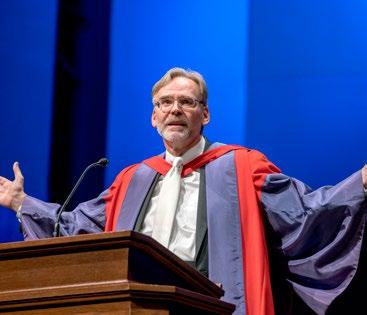
God ultimately wanted him to serve. “The tradition of W.T. Conner and James Leo Garrett Jr., the two premiere systematic theologians in the history of Southwestern, is my tradition, and God has called me to continue their pristinely biblical-Baptistevangelistic tradition of theology,” he says.
Toward this end, beyond teaching in the classroom, Yarnell has authored several books, including The Formation of Christian Doctrine and God the Trinity: Biblical Portraits , as well as numerous essays and articles. His personal passion is engaging in the theological interpretation of Scripture, listening to the questions that people have, and leading others to receive the Gospel of Jesus Christ.
In his submission to the Baptist World Alliance, Yarnell summarized: “My calling is to develop the pastoral character in the students, so that they will build the churches that glorify Jesus: this is my holy calling; this is what I do with all my mind. What are you doing with yours?”


46 Southwestern News Fall 2018
TO HEAR MORE OF DR. YARNELL?

“You have to spend a lot of time in Bible study— but you can’t disconnect from the world. You have to be conversant with all, and immersed in both the practical and the classical. I have to have one foot in the church, and one foot in academia—the Lord told me I was going to have to walk where people walk.”



swnews.org 47
WANT
(click on the video above)
RYAN STOKES
twitterbird @SirRyanStokes
facebook /ryan.stokes.5811
email rstokes@swbts.edu



48 Southwestern News Fall 2018
“What God has revealed matters. I believe that the Scriptures contain truth—truth that we are to believe. And I believe they are authoritative and that we are supposed to put into practice what the Scriptures teach us to put into practice.”
A WORTHY INVESTMENT OF ONE’S TIME: striving for a deeper understanding of God’s Word
By Alex Sibley | Photos by Kathleen Murray and Neil Williams
Ryan Stokes is mindful of the difference between spending one’s time and investing one’s time. As he explains to his children, video games, for example, are a means of spending their time, and they have nothing to show for it in the end beyond being entertained. On the other hand, through Stokes’ latest hobby of learning to play the banjo, he is acquiring a skill that he can continue to enjoy for the rest of his life.
Stokes, associate professor of Old Testament at Southwestern Seminary, says studying the biblical languages is like that. “When I’m practicing banjo, I’m working on scales, I’m working on the fundamentals of picking with my right hand and fretting with my left hand, and these exercises are not necessarily fun in and of themselves, but the enjoyment comes when I put all of these things together and can play a song,” he explains.
“Now, I do enjoy reading Hebrew and I enjoy reading Greek and Aramaic, but studying these languages, especially in the first year of studying in class, that’s not the fun part of it. That’s just the work in the trenches of learning the fundamentals so that you can have the payoff of being able to read in that language later and the epiphany that comes when you see a truth in the biblical text that you could not have seen in the English, and then you get to share that with your church. That’s the joy and the payoff that comes as a result of the investment that you made earlier on as a seminary student.”
Stokes speaks from experience: aside from English, he can read nine different languages—Hebrew, Greek, Aramaic, Ethiopic, Syriac, Latin, Ugaritic, German, and French. He therefore understands the importance of persevering in one’s studies, disciplining oneself to study and practice for a number
of years in order to learn the biblical and other ancient languages in order to then better understand the Bible and its historical context so that this knowledge and understanding can then be passed on to the church. With this in mind, the ultimate investment of Stokes’ time is in students as he helps them along the path to better understanding God’s inspired Word.
God called Stokes to this ministry during his junior year of college. Having come to know the Lord at age 5, Stokes already understood the importance of serving the Lord, but he was unsure of what specific ministry to which God would lead him.
“I took a class on the life and teachings of the Apostle Paul,” he says. “And that class opened up my eyes to a whole new avenue of ministry—of studying the Bible academically and then teaching it to others. And so, not long after that, I decided I wanted to be a Bible professor.”
Stokes was particularly interested in studying the Jewish context of the Bible. So, during his Ph.D. studies at Yale University, in addition to learning the biblical languages, he also learned extra-biblical languages in order to read ancient texts that had only been preserved in those languages. This allowed him to study numerous texts, including early Jewish literature, the Apocrypha, pseudepigrapha, and the Dead Sea Scrolls.
After Stokes graduated in 2010, he joined the faculty at Southwestern Seminary in order to both teach students as well as study the institution’s recently acquired Dead Sea Scroll fragments.
In his classes, Stokes has one primary goal for his students: he wants them to learn how to read the Bible, which requires understanding its historical context and being able to distinguish what the Bible teaches from their own theological presuppositions.
swnews.org 49 STEADFAST
For example, many people are quick to associate the serpent in Genesis 3 with Satan, but Stokes points out that Genesis 3 itself does not make this connection. Though his goal is not to convince students that the serpent is not somehow associated with Satan (in fact, he notes that some New Testament passages—such as Revelation 12:9 and Romans 16:20—seem to support such an interpretation), he does want students to recognize that the text of Genesis itself does not teach that.

“I want students to read Genesis in its own context and appreciate what it is that Genesis is teaching about the human predicament, about human sin, about the consequences of sin, without importing some of their own theological notions into that text,” Stokes says. “Some of the theological notions they have may be correct, but they’re not taught in that passage.”
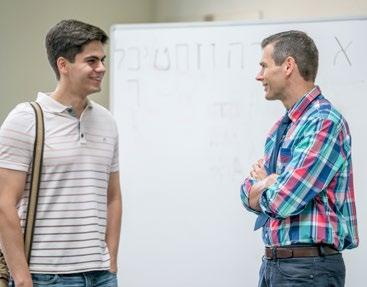


Though Stokes is certainly not opposed to systematic theology, he is wary of imposing one’s own theology onto a text. One way to remove such “theological goggles,” Stokes says, is to learn the biblical languages, and this is especially important for leaders in the church.
“English can capture certain aspects of what the biblical languages are communicating, but it can’t capture every single sense of what those languages are communicating,” Stokes says. “And you simply have to know the languages in order to pick up on those things.”
“What God has revealed matters,” he continues. “I believe that the Scriptures contain truth—truth that we are to believe. And I believe they are authoritative and that we are supposed to put into practice what the Scriptures teach us to put into practice. And we study the languages so that we can understand what the Bible teaches to the very best of our ability, because we want to believe correctly and we want to live correctly.”
Stokes has witnessed students for whom, once they removed what they concluded were “erroneous theological goggles” and utilized their studies to read the Bible as God originally communicated it, “it clicked.” He explains, “These biblical passages that were thought to exist out in some heavenly or theological limbo all of a sudden made sense in a way that they didn’t before. These students were able to say, ‘This biblical author was someone not a whole lot different from me, and he was writing to a church that wasn’t all that different from my church, and he’s making arguments that aren’t all that different from the arguments I might make.’”
“It comes together and makes so much sense,” Stokes concludes regarding reading the Bible in its original language and proper context. “So [this investment of their time] frees students up to teach the church correctly and not to make claims about the Bible and the Bible’s teachings that simply are not true.”
50 Southwestern News Fall 2018
WANT TO HEAR MORE OF DR. STOKES?


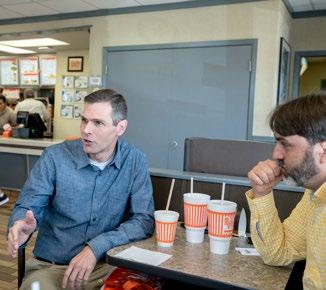
Stokes’ forthcoming book, tentatively titled The Rise of Satan: Sin, Suffering, and the Superhuman in the Hebrew Scriptures and Early Jewish Literature, presents a historical study of the theology of Satan. Regarding the biblical authors as well as other ancient Jewish thinkers, interpreters, and writers, the book asks such questions as, “What did they believe about Satan?” “Why did they believe these things?” “What did they write about Satan?” and “How did their thinking about Satan develop over time?” The book is scheduled for release in 2019.

swnews.org 51
(click on the video above)
‘SOUTHWESTERN MOVES FORWARD,’ BINGHAM TELLS SBC
By Alex Sibley
D. Jeffrey Bingham, interim president of Southwestern Baptist Theological Seminary, began his report to the Southern Baptist Convention in Dallas, June 13, with an acknowledgement that, though he came to talk about the future of Southwestern, “as a Baptist and as a Christian, I cannot speak to you about the future of the seminary without reflecting responsibly upon its past and what our intentions are in relationship to the past.”
Bingham made no direct reference to goings-on at the seminary in the month prior to the convention meeting, but he referred implicitly to the dismissal of Paige Patterson as president of Southwestern following a meeting of the executive committee of Southwestern’s board of trustees, May 30.
The entire board had previously met during a specially called meeting on May 22, and following 13 hours of discussion, Patterson was named president emeritus and Bingham was named interim president. In a news release following this initial meeting, trustees cited challenges facing the institution—including those of enrollment, finances, leadership, and institutional identity—as reasons for their decision.
In a release following the May 30 meeting, however, the executive committee shared that “new information” had been presented “regarding the handling of an allegation of sexual abuse against a student during Dr. Paige Patterson’s presidency at another institution and resulting issues connected with statements to the Board of Trustees that are inconsistent with SWBTS’s biblically informed core values.” In light of this, the executive committee resolved to terminate Patterson, effective immediately, removing all the benefits provided by the May 22 meeting, including the title of president emeritus.
In this context, Bingham addressed the messengers of the SBC, stating clearly his intention to create “a safe environment and a campus culture that protects and cares for the victims of abuse.”
“At Southwestern, we denounce all forms of abuse, all behavior that enables abuse, all behavior that fails to protect the abused, and
all behavior that fails to protect those who are vulnerable to abuse,” Bingham said. “We pray for the abused, and we agonize for them.”
Bingham said he instructed Southwestern faculty and staff to retake and complete a course in sexual harassment by July 31. Furthermore, he shared that seminary leadership is meeting with third-party agencies and ministries “that will help us to move forward in the ways in which we need to move forward in recognizing conditions that contribute to abuse and helping us to grow in our manner of how we respond to allegations of abuse and how we shall care for the abused.”
While such matters are his priority, Bingham declared that some things “have not changed and will not change” at Southwestern.
“By the grace of God and by His might, [the seminary] has weathered world wars, financial recessions, and eight presidential transitions,” Bingham said. “We have not moved physically, and I guarantee you we have not and will not move doctrinally.
“Our board of trustees, our faculty, and our administration are completely committed with integrity to the inspiration of Holy Scripture, to the inerrancy of Holy Scripture, and to the identity of Holy Scripture as the authority for our rule of faith and practice.”
Bingham assured messengers that Southwestern remains committed to world evangelization, to personal evangelism and discipleship, to the teaching and mentoring of students, and to the entire Baptist Faith and Message.
Bingham concluded his report with the affirmation that, though “our struggle is not against flesh and blood, but against the spiritual forces of darkness in the heavenly places,” the Lord Jesus Christ is exalted above every principality as He sits at the right hand of the Father. Furthermore, Bingham said, the Holy Spirit dwells within every believer, and one day, Jesus will return, and the Kingdom of God “will be ours to enjoy.”
“And so Southwestern moves forward,” Bingham said, “with the Son of God above us, with the Spirit of God within us, and with the Kingdom of God before us.”
JAPAN MISSION TEAM SEES 17 PROFESSIONS OF FAITH
 By Julie Owens
By Julie Owens
God answered prayers as 15 Southwestern students and faculty spent three weeks reaching the people of Japan with the Gospel, May 11-31. The mission team saw God’s hand in their work as they witnessed 17 professions of faith.
For Southwestern graduate Joseph Kim, a visit to a detention center was the most memorable aspect of the trip. “My ministry partner and I had fellowship with a detainee during a 30-minute session,” Kim says. “We shared prayer requests and, most poignantly, heard his favorite Bible verse. He cited Job 1:21: ‘Naked I came from my mother’s womb, and naked I will depart. The Lord gave and the Lord has taken away; may the name of the Lord be praised.’
“These words, coming from a refugee imprisoned far from his native land—Ghana, I believe—moved me, challenging me to greater endurance and joy in the faith. What a privilege to travel so far to see such faith.”
52 Southwestern News Fall 2018
CAMPUS NEWS
GOD DOES ‘ABUNDANTLY BEYOND’ EXPECTATIONS DURING CROSSOVER 2018
By Alex Sibley
Fruitful evangelism experiences abounded during this year’s Crossover, the Southern Baptist Convention’s annual evangelistic outreach prior to its annual meeting. Assembled on the Southwestern Seminary campus from multiple SBC seminaries, the 175 participants gathered for mornings of worship and teaching from various pastors and seminary professors, and then they hit the streets for door-to-door witnessing during the afternoons and evenings. By the end of this organized effort, June 4-10, 340 people had committed their lives to Christ.
God wasted no time in saving the lost during the six-day outreach. Not long after teams dispersed throughout the Dallas/Fort Worth metroplex on the first day, Southwestern evangelism professor Brandon Kiesling, who coordinated the Crossover efforts for five of the six SBC seminaries, wrote on Twitter, “Only an hour into our 1st evangelism time for #Crossover18 and already heard of one person accepting Christ! Lord, do it again!”
By Thursday morning, the teams had “exceeded the amount of homes that I thought we were going to do all week long, which is awesome,” Kiesling said. “… God is on the move here in Fort Worth.”

The efforts continued through Saturday, and the Holy Spirit moved numerous people to salvation. Using the hashtag #Crossover18, some of the teams posted celebratory photos of those who came to know the Lord throughout the week, inviting others to rejoice with them over the great things God was doing. Teams connected these new converts to local churches who committed to follow up with them and disciple them.
By the end of this six-day period, the Crossover teams had made 19,464 contacts, had 3,180 Gospel conversations, and seen 340 commitments.
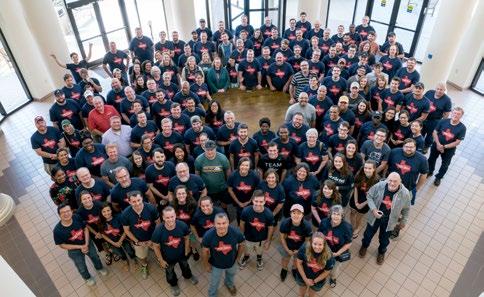
“Now that Crossover 2018 is in the books, I can see that I clearly underestimated what God can do through a large group of committed soul-winners,” Kiesling says. “I planned for 10,000 homes in 6 days; God doubled that. I planned for 2,000 Gospel conversations; God gave us more than 3,000. I planned for 200 commitments to Christ; God gave us 340.
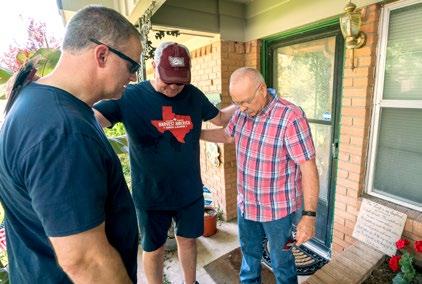
“God has a way of showing us that no matter how much we think He can do, He can do abundantly beyond what we can ask or think (Ephesians 3:20). To God be all the glory!”

swnews.org 53
CAMPUS NEWS
SOUTHWESTERN MISSION TEAM BRINGS HOPE OF THE GOSPEL TO SOUTH ASIAN COMMUNITIES
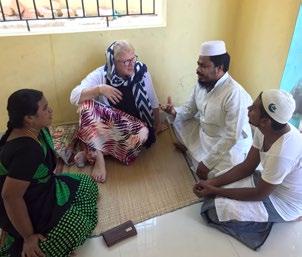
 By Katie Coleman
By Katie Coleman
During a recent mission trip to South Asia, Ruth,* a master’s student at Southwestern Seminary, noted the desire of those she met to be a people of worship. Unfortunately, Ruth says, their worship was always misplaced in objects or one of the thousands of Hindu gods that they believed would help them, bless their homes, and give them a valuable life.
People were searching, Ruth says, for an answer to their hardships. “Many people are just trying to survive,” she continues. “But then God reminded me that money is not the ultimate solution to life’s struggles. Jesus is the solution.”
PRESIDENTIAL SEARCH COMMITTEE APPOINTED

 By Staff
By Staff
A nine-member presidential search committee was announced Aug. 23 consisting of the following trustees: Danny Roberts (At Large, search committee chair), Denise Ewing (IL), Jamie Green (At Large, search committee secretary), Guy Grimes (CA), Todd Houston (NC), Tom James (KY), Philip Levant (At Large), Andre Palmer (NY), and Calvin Wittman (CO, search committee vice chair). Trustee chair Kevin Ueckert and vice chair Connie Hancock serve on the committee ex officio Roberts is an alumnus of Southwestern (Master of Church Music, 1979)
Eight Southwestern Seminary students partnered with South Asian missionaries, May 23 – June 11, to share this solution with people by going into neighborhoods to spread the Gospel to their residents. By the end of the trip, more than 60 people had professed faith in Christ and were connected with local missionaries for follow-up, baptism, and discipleship.
*Name changed to protect future mission work.
and has served as a trustee since 2016, sitting on the Communications, Policies, and Strategic Initiatives Committee. He currently serves as executive pastor of North Richland Hills Baptist Church.
The nine-member committee’s composition includes two women, one African-American, and one Hispanic. Moreover, the committee is mixed geographically (with three members from Texas), mixed in terms of trustee tenure (with five being in their first five-year term and the other four in their second five-year term), and only two members are members of the trustee executive committee.
54 Southwestern News Fall 2018
CAMPUS NEWS
THAI STUDENTS RECEPTIVE TO SOUTHWESTERN’S MESSAGE OF FAITH
 By Julie Owens
By Julie Owens
Fourteen evangelists from Southwestern Seminary witnessed 13 professions of faith as they took Christ’s message to Thailand, July 4-23. They ministered in Chiang Mai, the largest city in northern Thailand, where they reached out to students at two of the city’s universities.
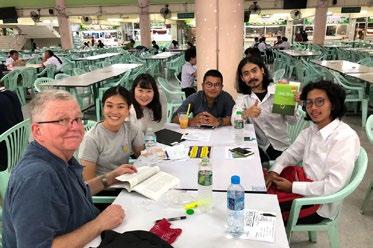
Master of Divinity student Vincent Crosby says he personally witnessed seven people hear the Gospel and confess belief in Jesus Christ. In one instance, Crosby had the opportunity to share the Gospel, answer questions regarding Scripture, and pray for a couple from Britain, who said they were atheists. Crosby said it was amazing
to observe how the Holy Spirit was working in the lives of these individuals as well as others with whom he shared the Gospel.
“The most significant gleaning that I gained from participating in this missionary trip was being reminded that all people everywhere are loved by God and regarded as valuable in His sight,” Crosby says. “… I was further reminded that God does not desire for any person to perish, but for all to come to the knowledge of truth, to repent and believe in Lord Jesus Christ.”
ONLINE MABC, ONGOING FLEX-ACCESS PROGRAM APPROVED
By Alex Sibley
A fully online Master of Arts in Biblical Counseling degree and an ongoing flex-access Ph.D. program have now been approved for Southwestern Seminary by the institution’s accrediting agency. The board of commissioners of The Association of Theological Schools
(ATS) met in early June to discuss three petitions from Southwestern, with the third being the relocation of the Havard campus in Houston to nearby Sagemont Church. All three petitions were approved.
ENGLISH LANGUAGE INSTITUTE APPROVED TO ACCEPT INTERNATIONAL STUDENTS
By Julie Owens
An ambitious project three years in the making is bridging the language gap for international students studying at Southwestern Seminary. On July 23, Southwestern’s English Language Institute was approved to expand to accept full-time international students who need to improve their English comprehension. Because language skills powerfully impact learning, the program is a game-changer for international students.
The 36-hour program includes instruction in grammar, speaking, listening, reading, writing, theological vocabulary, and academic skills. The program is for incoming students who score high enough on the Test of English as a Foreign Language (TOEFL) to have basic skills, but not high enough to begin a degree program at Southwestern.
“Students who couldn’t study here before at Southwestern now have a pathway,” says Caitlin Yowell, ELI director. “The intensive English program is a fast-paced study program. As practical preparation for the ministry, the ELI prepares English-language learners to study and communicate in English at the academic level and use English for global ministry. It’s really been a blessing.”
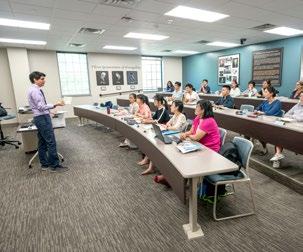
swnews.org 55
CAMPUS NEWS
BINGHAM SHARES DREAM FOR SOUTHWESTERN IN COMING ACADEMIC YEAR
By Alex Sibley
In his first address to the student body as interim president of Southwestern Seminary, D. Jeffrey Bingham expounded three virtues that should characterize every Southwesterner: self-denial, taking last place, and orienting one’s entire life around serving others. This word from the interim president came during the seminary’s fall convocation service, Aug. 23, which signified the start of the new academic year.
Bingham shared that his dream for Southwestern this academic year is for Southwesterners to be known by these three virtues. “Everywhere I go throughout the metroplex and throughout the nation and overseas,” he said, “I want to hear these words: ‘We can always tell
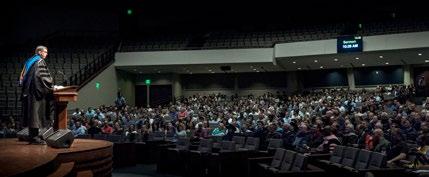
a Southwesterner, because she always denies herself.’ ‘We can always recognize a Southwesterner, because he always takes last place.’ ‘You know how we know that he is from Southwestern? Because his whole life is consumed with serving us.’”
“Southwesterners, the cross doesn’t just do something for you by forgiving you of your sins,” Bingham concluded. “The cross should do something to you—it should transform your heart into a heart that is consumed with denying yourself, with taking last place, and with serving others.”
BLAISING TO STEP DOWN AS EXECUTIVE VICE PRESIDENT, PROVOST
 By Staff
By Staff
Craig Blaising stepped back from his administrative post of executive vice president and provost, effective Oct. 1. He will continue at Southwestern as professor of theology and the Jesse Hendley Chair of Biblical Theology.
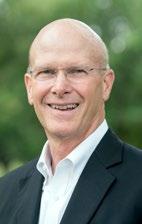
Blaising says that although for many years the Lord led him primarily to fulfill administrative responsibilities, the Lord is now leading him to focus on making further contributions to his academic fields.


George Klein, professor of Old Testament, will serve as interim chief academic officer of Southwestern Seminary in Blaising’s place, overseeing the institution’s entire academic division.
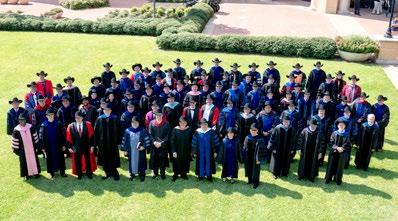
56 Southwestern News Fall 2018
CAMPUS NEWS
Watch Dr. Bingham’s full chapel sermon here. For more information on chapel, including the fall’s chapel schedule and archives of past services, visit swbts.edu/chapel.
STUDENTS GAIN NEW PERSPECTIVE ON BAPTIST HERITAGE DURING OXFORD STUDY TOUR
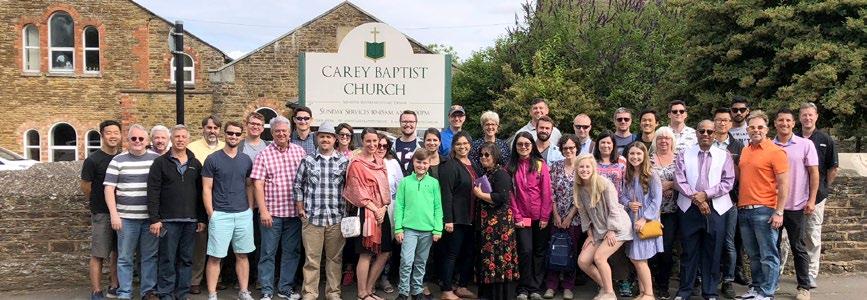 By Katie Coleman
By Katie Coleman
This summer, students went beyond the classroom to study Christian and Baptist heritage in the places where some of the most significant events occurred in Christian history. The annual Oxford Study Tour afforded students the opportunity to visit these sites while taking courses from seminary faculty and meeting with faithful Christian workers who currently serve in the United Kingdom.
Reflecting on interactions with people like Mary, a 94-year-old believer, and Craig, a man whom some students were able to lead to Christ, the Southwestern team expressed what a rich experience the Oxford Study Tour was. Whether through their study of Christian
events from 500 years ago, learning the stories of longtime faithful Christians, or leading a new person to Christ, each of the students noted God’s work in it all.
“The story of the church is all of our stories,” says master’s student Courtney McLean. “No matter what your passion is, there is much to be learned from the lives of those who have come before as well as the lives present today. Spending time in a different culture opens up your perspective on faith and life and facilitates meditation on your own calling.”
FACULTY WIFE, ALUMNA RUTH MACGORMAN DIES
By Alex Sibley
Barbara Ruth MacGorman, Southwestern graduate and wife of long-time Southwestern professor Jack W. MacGorman, died on Saturday, Sept. 29. She was 93.
MacGorman was born in Houston, Texas, on Feb. 13, 1925. Following her graduation from Baylor University in 1946, she enrolled in Southwestern Seminary, where she met and married Jack, who went on to become a professor of New Testament at the seminary for 53 years. The two met in a missions class in 1946 and married the following year.
MacGorman earned master’s degrees from Southwestern (Master of Religious Education, 1948) and TCU, and, at 57 years of age, a Doctor of Education from North Texas State University (now the University of North Texas). She subsequently served in the field of special education in Fort Worth ISD for 20 years.
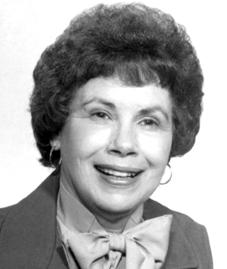
The MacGormans were members of University Baptist Church for 44 years,
with MacGorman teaching a ladies Bible study class for roughly 35 years. She also accompanied her husband as often as possible when he spoke or preached in churches, mission fields, and other Christian ministries around the world.
Even after Jack’s retirement from Southwestern in 2001, he and his wife faithfully attended the seminary’s chapel services three days a week for more than a decade. They were honored with Southwestern’s L.R. Scarborough Award in 2008, and in 2011, both were present as Southwestern dedicated the MacGorman Chapel and Performing Arts Center, named in honor of Jack MacGorman.
In a newspaper article celebrating their 70th wedding anniversary in 2017, the MacGormans said, “At 96 and 92, we are grateful that, for 70 years, we have had many good days, some bad days, but always together days.”
MacGorman is survived by her husband of 71 years, Jack; their seven children, Donald, Robert, Linda, Deborah, John, Adam, and Timothy; 13 grandchildren; and 13 greatgrandchildren. She was preceded in death by her son Stephen.
swnews.org 57
CAMPUS NEWS
FORMER FIRST LADY BETTY DILDAY DIES AT 87
By Staff
Betty Dilday, first lady of Southwestern Seminary from 1978-1994, died on Aug. 9 from complications from Pulmonary Fibrosis. She was 87.
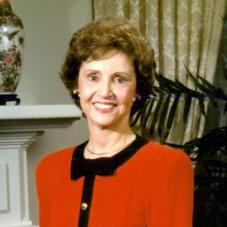
Dilday was born in Houston, Texas, on April 8, 1931, to Jewel and Lavergne Doyen. She went through Houston public schools and then graduated from Baylor University with a Bachelor of Arts in English. She later did graduate studies at Georgia State University, Southwestern Seminary, and the B.H. Carroll Theological Institute, where she received a Master of Arts in Religion.
Dilday met her future husband, Russell, in Bible class their junior year in Baylor. They married on Aug. 15, 1952, following their graduation. When Russell began his seminary studies at Southwestern, Dilday taught school in Fort Worth.
When the couple moved to Atlanta, Ga., for Russell to pastor the Second-Ponce de
Leon Baptist Church, Dilday again taught in public schools while their three children were attending Baylor.
Dilday accepted Christ as her personal Savior at 9 years of age and was baptized in First Baptist Church Houston. She served all her life as a Bible teacher, graded choir assistant, and missions leader. She served alongside Russell for 17 years in Texas and Georgia, and she continued that role for 16 years while Russell served as president of Southwestern Seminary. She later enjoyed a year as interim president’s wife with Russell at Howard Payne University.
In Atlanta and Dallas, Dilday encouraged a group of women to serve as volunteers to take smaller arrangements from the large altar flower arrangement to hospitals and shut-ins. This became an important flower ministry for those churches.
In 2011, Dilday was named Woman of Distinction by the Baylor Dallas Women’s
FORMER SEMINARY PREACHING PROFESSOR DIES AT 98
By Katie Coleman
Scott Tatum, Southwestern alumnus and former preaching professor, died Sept. 21. He was 98.
In his more than 75 years of ministry, Tatum was known for his leadership as a pastor, teacher, and leader even in his retirement years. Regarded as an authority in the field of preaching, Tatum’s impact reached thousands of people as he proclaimed the truth of Scripture.
Tatum started preaching while pursuing his bachelor’s degree, serving at several rural Texas churches. He first met his wife, Doris, while serving as a visiting preacher in Fairview, Texas. They met again one year later while both were attending Baylor University. They got married on June 17, 1942, and served together in ministry for more than 76 years. They had three children—Wilson, Patricia, and Kathryn.
Tatum attended Southwestern Seminary, where he earned his Master of Theology (1943) and Doctor of Theology (1949). While pursuing his theological education, Tatum also served fulltime at several churches, including First Baptist Church in Canton, Texas; First Baptist Church in
Hubbard, Texas; and Hyde Park Baptist Church in Austin, Texas.
In 1951, God called Tatum to pastor Broadmoor Baptist Church in Shreveport, La., where he served for 24 years. Under his leadership, the church grew to become the largest Baptist church in the Louisiana Baptist Convention.

In a 2015 Shreveport Times article, Tatum attributed some of this growth to revival and the evangelistic zeal sparked by evangelist Billy Graham’s three-week crusade in 1951.
“There was a spirit of revival in many of the churches, including ours,” Tatum told the Times. “It was one of the most wonderful periods in the growth of Broadmoor Baptist Church.”
After many faithful years of service behind the pulpit, Tatum responded to God’s call for a change in ministry. In 1975, Tatum moved to Fort Worth, where he became a professor of preaching at Southwestern Seminary. During his 14 years of service at Southwestern, Tatum taught and equipped hundreds of men who had answered the same call to ministry through preaching.
Following his retirement as professor at
Council, and in 2017, the Dilday family was awarded the title “Baylor’s First Family” by the Baylor Line Foundation.
The Dildays traveled extensively to all six continents, visiting missionaries and encouraging Baptist work there.
Dilday is survived by her husband of 66 years, Russell; children Robert, Nancy, and Ellen; six grandchildren; and two great-grandchildren.
Southwestern, the Tatum Preaching Chapel located in Scarborough Hall of the B.H. Carroll Memorial Building was dedicated in his honor. Upon retirement, Tatum and his wife returned to Shreveport and to Broadmoor Baptist Church. Although retired, he continued to serve in the church in various roles, including Sunday School teacher. He also served for many years as interim pastor for many local Baptist churches and held pastor emeritus status at Broadmoor Baptist Church.
Tatum is survived by his wife, Doris; their three children; and multiple grandchildren and great-grandchildren.
58 Southwestern News Fall 2018
IN MEMORIAM
FORMER PROFESSOR, ADMINISTRATOR DAVID FITE DIES
By Alex Sibley
James David Fite, a former professor and administrator at Southwestern Seminary, died on Aug. 1. He was 84.
Fite and his twin brother Donald were born to Clifton and Ruby Fite in Fort Worth, Texas, on Dec. 23, 1933. Fite felt called to be a pastor at an early age and was ordained for ministry on his 18th birthday in Cordele, Ga.
Fite did his undergraduate studies at Mercer University, where he met his wife, Margaret. After the two graduated in 1954, they married in Fitzgerald, Ga., on June 15, 1955. The couple then moved to North Carolina so that Fite could attend Southeastern Seminary.
In 1960, Fite and his family joined Margaret’s parents, Herbert and Marjorie Caudill, as missionaries in Cuba through the Home Mission Board. Fite pastored the Jamaican congregation at Buena Vista Baptist Church and taught classes at the Baptist seminary in Havana.
Five years later, in what Margaret later characterized as “an attack on religion,” the Cuban government conducted a coordinated arrest of Fite, Caudill, 40 Cuban pastors, and
13 laymen affiliated with the Baptist churches in western Cuba. Fite spent the next three and a half years in prison.
Though Fite and his fellow believers had to endure difficult conditions during their 42-month imprisonment, the church’s ministry continued outside the prison walls. As Fite later said, the Gospel “is not limited by political organizations. It moves ahead with a message that is beyond any oppression.”
Fite was released in 1968, and his family returned to the United States a few months later. They settled in Fort Worth, Texas, where Fite earned his Doctor of Ministry degree from Southwestern Seminary. He then joined the seminary’s faculty.
During Fite’s tenure at Southwestern, he co-authored the book Beginning Your Ministry with C.W. Brister and James L. Cooper, and he served as the director of continuing education and off-campus programs. In addition to launching numerous off-campus sites for ministry training throughout Texas and Oklahoma, Fite laid the groundwork for the construction of Southwestern’s continuing

FORMER TRUSTEE R.E. SMITH DIES
By Alex Sibley
Royal Everett “R.E.” Smith Jr., a former trustee of Southwestern Seminary, died on Sept. 7. He was 89.
Smith was born in Abilene, Texas, on Nov. 17, 1928, to Royal Everett Smith Sr. and Annie Willey Smith. He went on to join the U.S. Navy, serving in World War II. He married his wife Marilyn in 1954. They had two children.
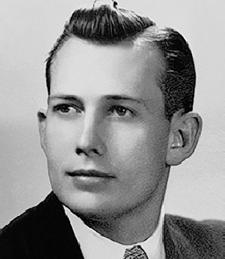
Smith was active in the local church, serving as a deacon at the First Baptist Church of Dallas. He also served on Southwestern Seminary’s board of trustees for over a decade, from the mid-1990s to early 2000s, as well as the seminary’s board of visitors.
“R.E. was a strong figure among a group of trustees who were instrumental in the completion of the conservative reformation of Southwestern,” says Craig Blaising, executive vice president and provost. “He loved the
seminary and took an active interest in all things Southwestern as long as he was able. Diane and I loved R.E. and Marilyn, and we will pray the Lord’s comfort for her in these days.”
In addition to serving on the board of trustees, Smith, along with his wife, also provided the Southwestern library with the Amy Glenn collection. Glenn was a Southwestern alumnus, completing her religious education degree in 1924 and going on to serve as a teacher in Texas schools.
Upon receiving the collection courtesy of the Smiths, then-dean of libraries Berry Driver said, “[This collection] provides a window into Southern Baptist life, particularly seminary life, here on campus during the 1920s.” The collection includes several cookbooks from local clubs and churches, a diary, selected books from An Interpretation of the English Bible
education and conference center, now known as the Riley Center.
After nearly 30 years at the seminary, Fite retired in 2000, and he and Margaret moved to Lilburn, Ga., to be nearer to family. They were active members of Smoke Rise Baptist Church, singing in the choir, teaching Sunday School, and serving as deacons.
Fite is survived by his wife of 63 years, Margaret; three sons, James, John, and Mark; 11 grandchildren; four great-grandchildren; his twin brother, Donald, and sister, Angeline Vandine; and many nieces, nephews, and extended family members.
by B.H. Carroll, church record books, some personal photos, and Glenn’s class ring from Southwestern Seminary.
Smith is survived by his wife of 64 years, Marilyn; their two children, Alan and Cynthia; and three grandchildren.
swnews.org 59
IN MEMORIAM
Everyday Evangelism Stories

Southwestern Seminary students and faculty strive to “Preach the Word, Reach the World,” and this often manifests through everyday evangelism encounters. Below are excerpts from articles about some of these encounters, detailing Southwesterners’ heart for evangelism and God’s sovereign grace in saving sinners.

Man comes to fix copier, becomes child of God
 By Alex Sibley
By Alex Sibley
[After praying to invite Christ into his life,] Jason then shared that he had only been a copier technician for three weeks.
Prior to that, he lost his previous job, moved to Texas because of a family member, and found new work fixing copiers. Despite the difficulties associated with such a turn of events, Jason said, “Looking back, I can now see this was all part of God’s plan.” … Jason had come to Southwestern merely to fix a copier, but through his God-appointed conversation with Southwestern professor Carl Bradford, he became a child of God.
Woman who asked God for sign begins walk with the Lord
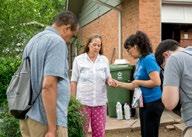 By Alex Sibley
By Alex Sibley
The woman was exuberant because of what had just transpired. She told the group, “I just want to hug you all. Thank you for coming to my door. I needed a sign, and God sent the Bible to my door.” Thus, the woman who had greeted them so grumpily just a few minutes earlier proceeded to give all of the evangelists a hug. “It was just amazing,” recalls master’s student Esther Constante. “You could see her face change completely. It was very encouraging.”
Man accepts ‘free gift’ of salvation
By Katie Coleman
As the team walked back to meet the other Crossover evangelists, a man from a work truck called out from his window, “What are you selling?” He and his friend had spotted the evangelism teams in their blue shirts advertising the upcoming Harvest America concert, and they were curious to find out what they were up to. … “My favorite part about the day was that the first thing he yelled at us was, ‘What are you selling?’” says Master of Divinity student Kim Whiten. “But that day, he met Jesus for free.”
Amid downtown clamor, Christ’s message reaches young soul
By Julie Owens
“It was very interesting that Landon, who has been interested in knowing more about baptism, ran into two different street evangelism groups and responded to the Gospel,” says M.Div. student Jenny Kim. “… I’m praying that the Holy Spirit will guide Landon’s family and their church family to minister to him.”
60 Southwestern News Fall 2018
Continue reading these articles and many more at: swbts.edu/news/everyday-evangelism
EVERYDAY EVANGELISM
A FULL AND WELCOMING WEEK


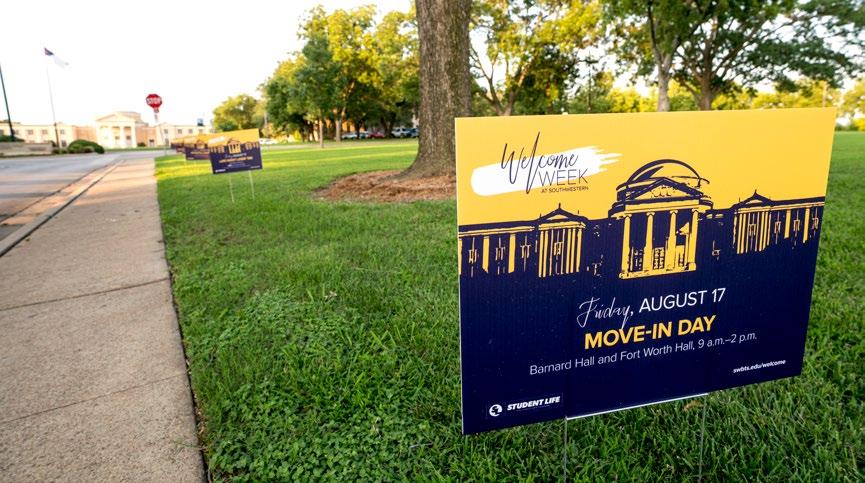 By Charles Patrick, Jr.
By Charles Patrick, Jr.
The first week of the new academic year at Southwestern Seminary and Scarborough College was one filled with excitement, fellowship, fun, and food. Returning students, faculty, and Student Life staff embraced the new students into the Southwestern family, helping them learn about Texas, Fort Worth, and the campus. Welcoming activities included move-in days for the men’s and women’s dormitories and perimeter student housing, late-night laser tag in the RAC, copious dinners to foster community and fellowship, post-convocation “lunch on the lawn,” Library Palooza, an ice cream social, a church and job fair and picnic, college and graduate student orientation, and much more.

swnews.org 61
STUDENT LIFE








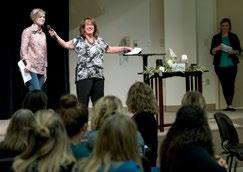

62 Southwestern News Fall 2018 STUDENT LIFE

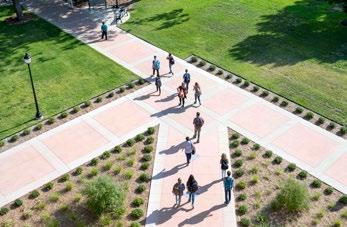
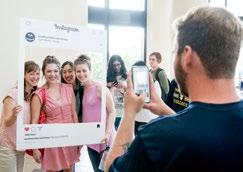
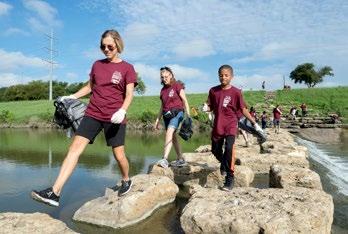


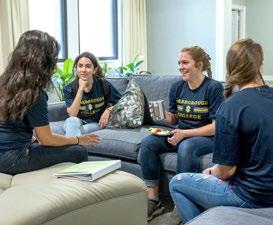



swnews.org 63 STUDENT LIFE


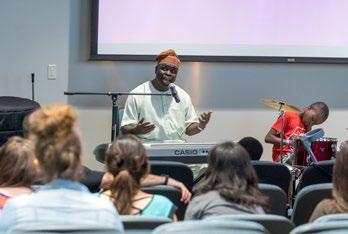







64 Southwestern News Fall 2018 STUDENT LIFE




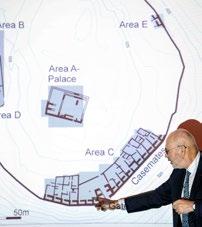
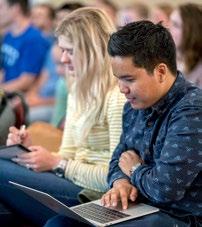



swnews.org 65 To see additional photos as well as videos from Student Life and other campus activities, visit Facebook.com/swbts STUDENT LIFE
“You are the light of the world. A city set on a hill cannot be hidden…. Let your light shine before men in such a way that they may see your good works, and glorify your Father who
Like any city, Southwestern supervises its own electrical, water, phone, land, clinic, housing and security. All of these components are crucial for making Seminary Hill an efficient and effective training center for future ministers of the Gospel.

The Southwestern Fund maintains the institution’s operating budget, providing for these various aspects of its daily needs—from building maintenance and landscaping to utilities. The fund subsidizes tuition, housing, and services; every dollar contributed goes toward students’ overall education costs, thereby keeping tuition as low as possible.
Will you consider contributing to this fund so that Southwestern may continue to be a light in this dark world, sending out Gospel ministers to reach the nations with the hope of Jesus? To contribute or to learn more, visit swbts.edu/give.
is in heaven.”
(Matthew 5:14-16)
Alumni Updates
1980
William R. Pawson (MDIV 1987) to Covenant Presbyterian Church, Casa Grande, Ariz., as pastor.
2000
Jeff Robinson (Adv. MDIV 2008) to Grace Fellowship Church, West Palm Beach, Fla., as lead pastor, with wife Jenn Robinson.
Retirement
Michael Robinson (MRE 1976) retired with wife, Kathy Robinson, living in Davenport, Iowa.
Larry T. Westman (MDIV 1978) retired with wife, Melissa C. Westman, living in Pensacola, Fla.
Roger Pursley (MACM 1984) retired, living in Tallahassee, Fla.
Anniversaries
Paul G. Barnes (MRE 1959) and Barbara J. (Hawkins) Barnes, 64th wedding anniversary (November)
O. Farrell Blankenship (MRE 1960) and Joann (Oakey) Blankenship, 60th wedding anniversary (July)
William Millican (MDIV 1960) and Darlene Millican, 60th wedding anniversary (August)
Elbert P. Channell (DIPTH 1976) and Mary Ann (Hagler) Channell, 66th anniversary (August)
James P. (Pat) Leverington (MDIV 1981) and Katrella Leverington, 43rd anniversary (August)
Memorial
1940
Scott Tatum (THM 1943, THD 1949)
Barbara Ruth MacGorman (MRE 1948)
1950
Billy J. Tolbert (BDIV 1953)
Hazel D. Gilstrap (MRE 1959)
1960
Lee D. Gregory (MRE 1967)
1970
Betty D. Dilday (EX-RE 1978)
1980
Allen C. Bratcher (MDIV 1984)
William L. Stone (MDIV 1987)
Keep in Touch
We love to hear from Southwesterners from all over the world. If you have recently changed ministry positions or celebrated a retirement, anniversary, or birth, we would love to hear about it. Please contact us at:
Mailing Address: PO Box 22500 Fort Worth, TX 76122-0500
Physical Address: 2001 W. Seminary Drive Fort Worth, TX 76115

Phone (toll free): 1.877.GO.SWBTS (1.877.467.9287)
Phone (local): 817.923.1921, ext. 7200
Email: friendsofsouthwestern @ swbts.edu
swnews.org 67 AROUND THE WORLD
WHICH PATH WILL SOUTHWESTERN TAKE?
By Charles Patrick, Jr.
Iwas on an early morning hike on Eagle Mountain when I came to a proverbial fork in the road. The sun was just rising over the cliff and treetops when the hiking trail bifurcated. I had to decide which direction to take. It dawned upon me that many in the Southern Baptist Convention and the watching evangelical world are similarly wondering what direction Southwestern Baptist Theological Seminary will take in the midst of the journey it has been on since April. The answer to that question is as clear as mountain spring water— Southwestern Seminary remains steadfast “on a hot trail after the lost.”1
Southwestern Seminary, by the grace of God and the support of Southern Baptists, has existed for more than 110 years. It remains on top of Seminary Hill today, the highest natural elevation in Tarrant County, and will continue to sit on Seminary Hill as a beacon of theological education. Its direction is clear: Southwestern Seminary assists the churches of the Southern Baptist Convention by biblically educating God-called men and women for ministries that fulfill the Great Commission and glorify God.
L.R. Scarborough, Southwestern Seminary’s second president, stated it this way:
“[Southwestern Seminary] can give soul-winners to every line and phase of denominational task. We propose to give evangelists, evangelistic pastors, evangelistic Gospel singers, soulwinning teachers, and spiritual leaders in all the lines of Christian service. If Southwestern Seminary has any phase of its work which is
unique, if it gives special emphasis to anything, probably it is in the line of fervent evangelism. The entire administration and teaching force, the whole life of the institution, is set to the high notes of soul-winning.”
Likewise, Robert Naylor, Southwestern’s fifth president, posited that the seminary’s driving force is “to train God-called men and women for a witness to the whole world.” He further stated:
“Evangelism is to be the main business of the Kingdom of God. To the degree that this seminary is based in evangelism, bathed in evangelism, committed to evangelism, rooted in evangelism, the institution is a quickening flame and an all-embracing arm of love around the whole world.”
I’ve hiked countless trails across the U.S., wearing out numerous pairs of hiking boots. Trails possess peaks and valleys; difficult and, yes, even painful portions; moments of shear wonder and worship and moments of terror; and even moments of “Why did I do that?” Southwestern Seminary’s 110-year journey has been no different. Yet, it remains steadfast “on a hot trail after the lost.”
Why does Southwestern remain steadfast on the trail in spite of obstacles caused by theological, social, economic, or personality issues during the past 110 years? It does so because men and women like B.H. Carroll,
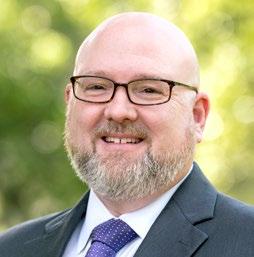
L.R. Scarborough, Floy Barnard, and others instilled into Southwestern Seminary the unwavering DNA of evangelism rooted in the Great Commission. Yes, Southwestern needs to do some things differently, and it will. Southwestern will adjust its backpack and center of gravity, modify the pace and rhythm of its gait, and retie the laces on its hiking boots—all needful things. Importantly and without reservation, it will remain on the trail—it will not sit down, will not turn back, and will not take wrong paths. The stakes are too high, eternal in fact. The souls of the lost provide the impetus to remain on the trail.
To be sure, although the trail has been rocky the past few months, Southwestern Seminary has not missed a step, tripped on a rock, or been bitten by a rattlesnake. It remains on the trail. Steadfast.
CHARLES PATRICK, JR. serves as vice president for strategic initiatives and communications at Southwestern Seminary.
last word
68 Southwestern News Fall 2018
1Final word from B.H. Carroll (Southwestern’s first president) to L.R. Scarborough (Southwestern’s second president): “My deep concern is about the seminary. Keep it on a hot trail after the lost. That is why I started the Chair of Evangelism and chose you as its professor. Never let it get away from the compassion of Calvary. Keep it missionary and true to the truth. Give it the best of your life.”
31 Truths to Shape Your Youth Ministry
 By Richard Ross
By Richard Ross
Designed to guide adults who value teenagers into a deeper walk with King Jesus, this devotional book shapes the hearts of youth leaders so that they, in turn, may shape the hearts of teenagers, turning them into lifetime disciples of Jesus.
Let the Text Talk: Preaching that Treats the Text on its Own Terms
 By Kyle Walker
By Kyle Walker
An update/revision of a work by Southwestern's first preaching professor, Jeff Ray, this volume supplies a basic how-to manual on text-driven preaching.
NEW from Seminary
Hill Press
These and other titles are available at SeminaryHillPress.com seminaryhillpress.com



























 D. Jeffrey Bingham Interim President
D. Jeffrey Bingham Interim President
































































































































 By Julie Owens
By Julie Owens





 By Katie Coleman
By Katie Coleman

 By Staff
By Staff
 By Julie Owens
By Julie Owens



 By Staff
By Staff




 By Katie Coleman
By Katie Coleman







 By Alex Sibley
By Alex Sibley
 By Alex Sibley
By Alex Sibley


 By Charles Patrick, Jr.
By Charles Patrick, Jr.










































 By Richard Ross
By Richard Ross
 By Kyle Walker
By Kyle Walker











